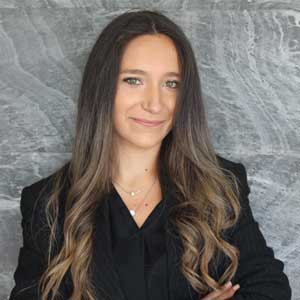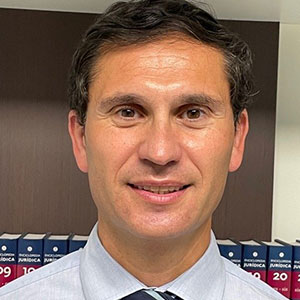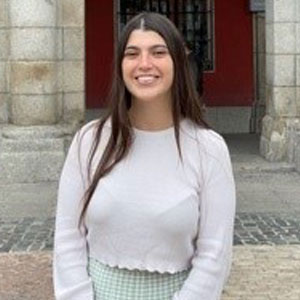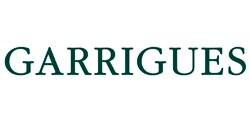Master´s Degree in Legal Practice and Representation

The best professionals in Legal Practice and Representation, a guarantee of an excellent education
Our faculty is made up of a cast of top-level legal and representation professionals who transmit their knowledge and experience to our students, thus training future lawyers and attorneys with honesty, values, and principles.
In its search for excellence, Nebrija has set up a team of first-rate professionals and academics who are willing and prepared to give you the best education that will lead to success with rigorous professional and academic training.
In addition, you can enhance your Master's degree with specialization diplomas in various areas of law, such as insurance law and risk management, tax consulting, health law and biotechnology, legaltech, and corporate law. These complementary qualifications are designed to help students specialize and gain access to leading offices, companies, and national and international institutions within their sectors.
Our Master's Degree in Legal Practice and Representation is recognized throughout the European Higher Education Area as a program that provides qualifications for those purposes in current Law 34/2006 of October 30 on accessing the professions of Lawyer and Court Attorney.
The degree has a practical approach based on the study of real cases in a master's degree that was created by and for legal practice and representation professionals, with an innovative program due to its methodology, both face-to-face and remote, along with first-rate materials and practical cases that guarantee the in-depth study of the necessary knowledge.
Nebrija University guarantees you practical training with the best lawyers and attorneys in the country in order to acquire, in addition to the necessary theoretical experience, the best practical experience in order to obtain the necessary skills to practice law.
This Master's degree completely focused on the preparation for the Ministry of Justice's entrance exams, in order to turn young lawyers into expert professionals in legal practice and and prosecution, developing all the required competences and abilities.
Specialize in Different Areas of Law
The Master's degree can be combined with expert courses or executive programs, providing a level of specialization that will enhance our students' opportunities to join leading national and international offices and companies in their respective fields.
Thanks to the hybrid format of these courses, students can complete their specialization either in person or remotely, offering flexibility to accommodate different learning preferences and schedules.
You will learn from the best professionals in Spain
Curriculum
BOE No. 187, of August 6, 2013
All of our degrees and curricula have been prepared in accordance with the new guidelines set by current legislation, having already been verified by the National Agency for Quality Assessment.
The student must take 90 credits
First Semester 30 ECTS
- 2 ECTS | Professional ethics
- 2 ECTS | Interpersonal skills
- 2 ECTS | Evidentiary methods and techniques in the jurisdictional protection of rights
- 1 ECTS | Strategic management applied to defense
- 2 ECTS | Alternative dispute resolution systems
- 1 ECTS | Legal research techniques
- 1 ECTS | Teamwork techniques
- 1 ECTS | Analysis techniques and processes
- 5 ECTS | Case Study Classroom
- 1 ECTS | Organizational environment and billing
- 1 ECTS | Professional legal framework
- 4 ECTS | Tax Law
- 3 ECTS | Private International Law
- 4 ECTS | Criminal law
Second Semester 30 ECTS
- 3 ECTS | Administrative law
- 3 ECTS | Community Law
- 4 ECTS | Civil Law
- 3 ECTS | Labor Law
- 4 ECTS | Commercial Law
- 3 ECTS | Bankruptcy Law
- 4 ECTS | Computer and New Technologies Law
- 6 ECTS | Professional internship I
Third Semester 30 ECTS
- 24 ECTS | Professional internship II
- 6 ECTS | Master’s Thesis
Professors
Tal y como está concebido el Máster en Acceso a la Abogacía y a la Procura de la Universidad Nebrija, el profesorado y tutores resultan pieza clave en el éxito del programa. Por ello, se ha cuidado una selección del personal dedicado al programa muy exigente para dotar las plazas docentes del programa, buscando un equilibrio entre profesores académicos, abogados y procuradores, de modo que en su inmensa mayoría, el profesorado, cuenta con el grado académico de doctor en derecho pero acumula en su experiencia vital una media de más de diez años de ejercicio profesional activo.
Por lo que toca a las materias propias del marco regulatorio profesional y destrezas y habilidades personales, el profesorado designado tiene amplia experiencia docente pero especialmente profesional en el ámbito de las respetivas disciplinas. En las materias relativas a los distintos órdenes jurisdiccionales, la parte de la disciplina más teórica ha sido definida por profesores doctores acreditados y en todo caso, los casos prácticos, clave fundamental del proceso formativo, o bien son seleccionados entre cientos de asuntos reales defendidos en todas las instancias jurisdiccionales, o bien son diseñados por equipos multidiciplinares bajo la supervisión conjunta de un profesor doctor acreditado y un abogado o un procurador con más de quince años de experiencia profesional como ejerciente.
Nebrija University's Master's Degree in Legal Practice is conceived so that the teaching staff and tutors are key pieces in the success of the program. For this reason, a selection of the staff dedicated to this very demanding program was chosen in order to fill the teaching positions of the program, seeking a balance between academic professors, lawyers and attorneys, so that the vast majority of the teaching staff has the academic degree of PhD in Law, but also accumulates an average of over ten years of active professional practice in their life experience.
Regarding the courses of the professional regulatory framework and personal skills and abilities, the designated faculty has extensive teaching -but especially professional- experience in the field of their respective disciplines. In courses relating to the different jurisdictional orders, the most theoretical part of the course has been defined by accredited PhD professors, and all practical cases, which are a fundamental key to the educational process, are either selected from among hundreds of real cases defended in all judicial bodies, or they are designed by multidisciplinary teams under the joint supervision of an accredited PhD professor and a lawyer or a solicitor with over fifteen years of professional practice.
| Profesores Professors | % doctores perfil académico % PhDs with academic profile |
70 |
85% |
|
|
|
Todos los perfiles profesionales cuentan con más de 3 años de ejercicio profesional activo como abogados y procuradores ejercientes.
All professional profiles have over 3 years of active professional experience as practicing lawyers and attorneys.
| |
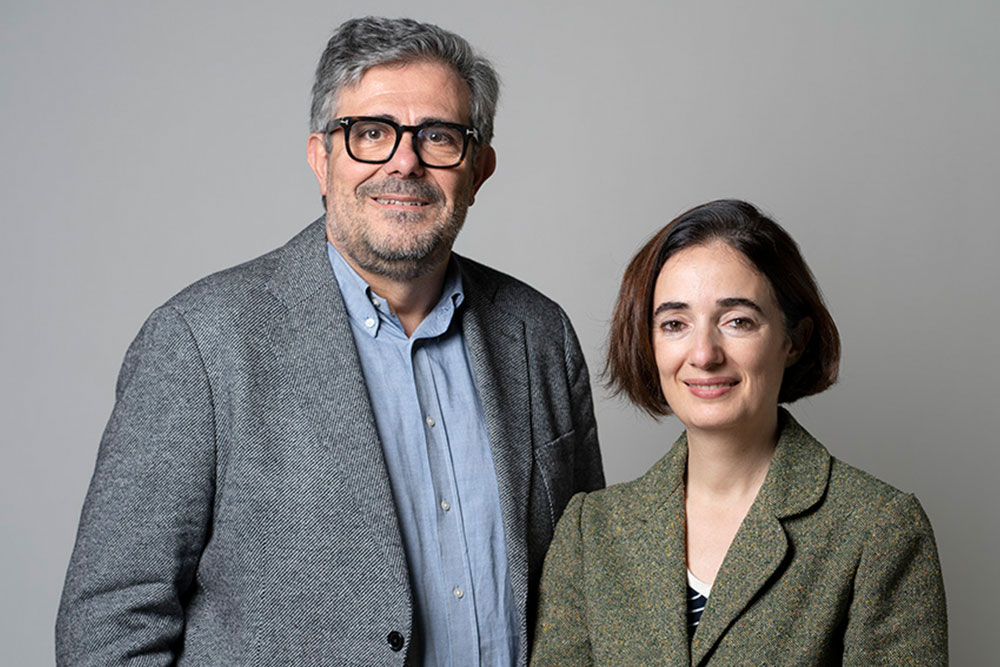
Directores del programa:
Jordi Regi y Mónica Pucci
"Estamos preparados y a vuestra entera disposición para ayudaros en este recorrido tan importante para vuestra carrera profesional"
 Jordi Regi Rodriguez
Director del Máster (Modalidad A distancia)
Jordi Regi Rodriguez
Director del Máster (Modalidad A distancia) Profesor Director of Master's Degree (Online Modality)
Professor Doctor en Derecho por la Universidad Nebrija. Diploma de Estudios Avanzados en Derecho Comunitario por la Universidad Nebrija. Licenciado en Derecho por la Universidad de Barcelona. Académico Correspondiente de la Real Academia de Jurisprudencia y Legislación.
Ha trabajado durante 15 años como Asesor de la Presidencia de la Comunidad de Madrid en el Área de Asuntos Europeos donde realizaba informes de compatibilidad de las ayudas de estado con el Derecho Comunitario, el seguimiento y coordinación de los procedimientos de infracción de la UE y funciones de coordinación y protocolo de su área.
Ha realizado publicaciones sobre diversos temas relacionados con la Unión Europea, ha asistido a conferencias y congresos tanto nacionales e internacionales sobre la temática y también sobre el modelo de enseñanza elearning de la Universidad.
Ha sido Tutor de Practicum de la Universidad Carlos III y de la Universidad Autónoma de Madrid, además de profesor honorario de ésta última. Ha sido Tutor de Prácticas de Derecho Constitucional en la Universidad de Barcelona y profesor del módulo de régimen jurídico de la Comunidad de Madrid.
Actualmente es Director del Master Universitario de Acceso a la Abogacía y a la Procura, Coordinador del área de Derecho Internacional y Derecho de la UE y Coordinador del Master en Ciberdelincuencia en la Universidad Nebrija.
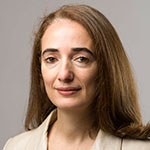 Mónica Pucci
Directora del Máster en Acceso a la Abogacía y a la Procura (Modalidad presencial)
Director of the Master in Access to the Legal Profession (Classroom attendance modality)
Doctora en Derecho Procesal por la UCM (2000), Licenciada en Derecho por la UCM (1996) y Graduada en Ciencias Jurídicas de las Administraciones Públicas por la UNED (2021). Diplomatura Práctica de Derecho Tributario (nº 2 de la promoción) y Diplomatura Práctica de Derecho Inmobiliario por la Escuela de Práctica Jurídica de la UCM. Curso de Procurador de los Tribunales (nº 2 de la promoción) por la misma Escuela. Título de la tesis doctoral: “El Juicio Verbal Ordinario”. Procuradora de los Tribunales del Ilustre Colegio de Procuradores de Madrid (ICPM), ejerciente desde 2005. Profesora en el Departamento de Derecho de la Facultad de Derecho y Relaciones Internacionales de la Universidad Antonio de Nebrija, Directora del Máster Abogacía en modalidad presencial y Directora de la Clínica Jurídica en esta Universidad. Anteriormente ha sido Directora del Grado en Seguridad y ha impartido docencia en Grado y Postgrado en varias Universidades, en Derecho Procesal y otras asignaturas (Universidad Rey Juan Carlos, Universidad Alfonso X el Sabio, Eserp Business School Madrid y UNED). Actualmente vocal de la Comisión de Formación del ICPM, ha sido vocal de la Comisión de Turno de Oficio y Justicia Gratuita. Colegiada adscrita a la Union Internationale des Huissiers de Justice/International Union of Judicial Officers (UIHJ), asociación de agentes de ejecución. Profesora-preparadora de opositores a la Administración de Justicia. Perito Contador-partidor. Experta en actos de comunicación procesales. Investigadora y ponente en varias jornadas, congresos y seminarios sobre Derecho Procesal. Autora de varios artículos y capítulos de libros.
Mónica Pucci
Directora del Máster en Acceso a la Abogacía y a la Procura (Modalidad presencial)
Director of the Master in Access to the Legal Profession (Classroom attendance modality)
Doctora en Derecho Procesal por la UCM (2000), Licenciada en Derecho por la UCM (1996) y Graduada en Ciencias Jurídicas de las Administraciones Públicas por la UNED (2021). Diplomatura Práctica de Derecho Tributario (nº 2 de la promoción) y Diplomatura Práctica de Derecho Inmobiliario por la Escuela de Práctica Jurídica de la UCM. Curso de Procurador de los Tribunales (nº 2 de la promoción) por la misma Escuela. Título de la tesis doctoral: “El Juicio Verbal Ordinario”. Procuradora de los Tribunales del Ilustre Colegio de Procuradores de Madrid (ICPM), ejerciente desde 2005. Profesora en el Departamento de Derecho de la Facultad de Derecho y Relaciones Internacionales de la Universidad Antonio de Nebrija, Directora del Máster Abogacía en modalidad presencial y Directora de la Clínica Jurídica en esta Universidad. Anteriormente ha sido Directora del Grado en Seguridad y ha impartido docencia en Grado y Postgrado en varias Universidades, en Derecho Procesal y otras asignaturas (Universidad Rey Juan Carlos, Universidad Alfonso X el Sabio, Eserp Business School Madrid y UNED). Actualmente vocal de la Comisión de Formación del ICPM, ha sido vocal de la Comisión de Turno de Oficio y Justicia Gratuita. Colegiada adscrita a la Union Internationale des Huissiers de Justice/International Union of Judicial Officers (UIHJ), asociación de agentes de ejecución. Profesora-preparadora de opositores a la Administración de Justicia. Perito Contador-partidor. Experta en actos de comunicación procesales. Investigadora y ponente en varias jornadas, congresos y seminarios sobre Derecho Procesal. Autora de varios artículos y capítulos de libros.
 Natalia Abajas Hilario
Profesora
Professor
Licenciada en Derecho por la Universidad Carlos III de Madrid/Máster en Acceso a la Abogacía y Asesoría Jurídica de la Empresa por la Universidad Carlos III de Madrid. Desde el inicio de mi carrera profesional como abogada en el año 2003, llevo ejerciendo la Abogacía, en distintos órdenes jurisdiccionales, tanto en Despachos de Abogados, como en Dptos. Jurídicos de Empresa. En Mayo de 2014 me incorporé como Abogada en el Departamento de Asesoría Jurídica de la Universidad Nebrija y en el que, como Responsable del mismo desde el año 2015, se presta una asistencia jurídica integral que englobe las necesidades de todas las entidades Nebrija. Para ello, se da respuesta a las necesidades jurídicas planteadas por los distintos departamentos, académicos o de servicios. En concreto, las funciones desarrolladas consisten en: Asesoramiento legal interno; Extrajudicial y Judicial: ostento la dirección letrada en procedimientos judiciales ante los distintos órdenes jurisdiccionales.
Natalia Abajas Hilario
Profesora
Professor
Licenciada en Derecho por la Universidad Carlos III de Madrid/Máster en Acceso a la Abogacía y Asesoría Jurídica de la Empresa por la Universidad Carlos III de Madrid. Desde el inicio de mi carrera profesional como abogada en el año 2003, llevo ejerciendo la Abogacía, en distintos órdenes jurisdiccionales, tanto en Despachos de Abogados, como en Dptos. Jurídicos de Empresa. En Mayo de 2014 me incorporé como Abogada en el Departamento de Asesoría Jurídica de la Universidad Nebrija y en el que, como Responsable del mismo desde el año 2015, se presta una asistencia jurídica integral que englobe las necesidades de todas las entidades Nebrija. Para ello, se da respuesta a las necesidades jurídicas planteadas por los distintos departamentos, académicos o de servicios. En concreto, las funciones desarrolladas consisten en: Asesoramiento legal interno; Extrajudicial y Judicial: ostento la dirección letrada en procedimientos judiciales ante los distintos órdenes jurisdiccionales.
 Jose Maria Abella Rubio
Profesor
Professor
Dr. y abogado en ejercicio +3 años; Doctor en Derecho por la Universidad San Pablo CEU, Licenciado en Derecho por la Universidad Complutense de Madrid, Curso General de la Escuela de Práctica Jurídica de la Universidad Pontificia de Comillas (ICAI-ICADE). Es miembro del Ilustre Colegio de Abogados de Madrid. Socio de las áreas de Procesal y Arbitraje de ECIJA.
Jose Maria Abella Rubio
Profesor
Professor
Dr. y abogado en ejercicio +3 años; Doctor en Derecho por la Universidad San Pablo CEU, Licenciado en Derecho por la Universidad Complutense de Madrid, Curso General de la Escuela de Práctica Jurídica de la Universidad Pontificia de Comillas (ICAI-ICADE). Es miembro del Ilustre Colegio de Abogados de Madrid. Socio de las áreas de Procesal y Arbitraje de ECIJA.
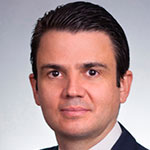 Pedro Alcalá Ruíz
Profesor
Professor
Doctor en Derecho Mercantil (Universidad de Alcalá de Henares); Licenciado en Derecho (Universidad de Granada); Master en Tributación y Dirección Financiera y Contable de la empresa (Universidad de Granada); LLM in Commercial Law (University of Bristol, Reino Unido); Executive Program Corporate Legal (Instituto de Empresa, Madrid); Executive Program Corporate Restructuring and Insolvency Law (Instituto de Empresa, Madrid) y Programa para Consejeros; XI Edición (Esade, Madrid).
Pedro Alcalá Ruíz
Profesor
Professor
Doctor en Derecho Mercantil (Universidad de Alcalá de Henares); Licenciado en Derecho (Universidad de Granada); Master en Tributación y Dirección Financiera y Contable de la empresa (Universidad de Granada); LLM in Commercial Law (University of Bristol, Reino Unido); Executive Program Corporate Legal (Instituto de Empresa, Madrid); Executive Program Corporate Restructuring and Insolvency Law (Instituto de Empresa, Madrid) y Programa para Consejeros; XI Edición (Esade, Madrid).
Inició su carrera en auditoría de cuentas y luego trabajó en un despacho tributario durante 5 años.
Su práctica profesional se centra en las áreas de Derecho Societario, M&A y Gobierno Corporativo (sociedades cotizadas y entidades de crédito), habiendo participado en algunas de las operaciones de refinanciación más importantes que se han cerrado en España en los últimos años. Experiencia acreditada en Derecho Contractual, Arbitrajes Internacionales (CCI) y en Derecho procesal civil.
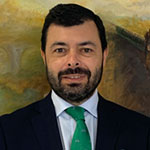 Antonio Alvardez Dardet Lama
Profesor
Professor
Licenciado en Derecho por la Universidad de Sevilla y Máster en TADE por el Instituto de Estudios Empresariales y Jurídicos de El Monte.
Experto en Derecho Civil, Familia, Sucesiones, reclamaciones de cantidad y Derecho de Seguros. Así mismo cuenta con amplia experiencia en reclamaciones contra la Administración Pública, Derecho Penal , Derecho Mercantil y reclamaciones de dominios web.
Actualmente es profesor del Centro Universitario San Isidoro, adscrito a la Universidad Pablo de Olavide, donde imparte las materias de Derecho Civil Parte General, Derecho de Familia y Sucesiones, así como Historia del Derecho. Ejerce como tutor de alumnos en prácticas del Máster de Abogacía. Colaborador ocasional con el diario ABC de Sevilla en artículos de contenido jurídico.
Antonio Alvardez Dardet Lama
Profesor
Professor
Licenciado en Derecho por la Universidad de Sevilla y Máster en TADE por el Instituto de Estudios Empresariales y Jurídicos de El Monte.
Experto en Derecho Civil, Familia, Sucesiones, reclamaciones de cantidad y Derecho de Seguros. Así mismo cuenta con amplia experiencia en reclamaciones contra la Administración Pública, Derecho Penal , Derecho Mercantil y reclamaciones de dominios web.
Actualmente es profesor del Centro Universitario San Isidoro, adscrito a la Universidad Pablo de Olavide, donde imparte las materias de Derecho Civil Parte General, Derecho de Familia y Sucesiones, así como Historia del Derecho. Ejerce como tutor de alumnos en prácticas del Máster de Abogacía. Colaborador ocasional con el diario ABC de Sevilla en artículos de contenido jurídico.
 Mercedes Aramendia Falco
Profesora
Professor
Presidenta de la Unidad Reguladora de Servicios de Comunicaciones en Uruguay y Directora del Postgrado de Transformación Digital y el Derecho en la Universidad de Montevideo. Doctora en Ciencias Jurídicas en la Universidad de Granada, aprobando con sobresaliente Cum Laude, LLM en Derecho, Tecnología y Emprendedurismo en la Universidad de Cornell Law School en Estados Unidos, y abogada en Uruguay. Graduada en Derecho por la Universidad Antonio de Nebrija.
Mercedes Aramendia Falco
Profesora
Professor
Presidenta de la Unidad Reguladora de Servicios de Comunicaciones en Uruguay y Directora del Postgrado de Transformación Digital y el Derecho en la Universidad de Montevideo. Doctora en Ciencias Jurídicas en la Universidad de Granada, aprobando con sobresaliente Cum Laude, LLM en Derecho, Tecnología y Emprendedurismo en la Universidad de Cornell Law School en Estados Unidos, y abogada en Uruguay. Graduada en Derecho por la Universidad Antonio de Nebrija.
 Ignacio Arroyo Martinez
Profesor
Professor
Catedrático emérito de Derecho Mercantil en la UAB, especialista en derecho deportivo y árbitro internacional. Licenciado en Derecho por la Universidad de Deusto (Bilbao), obtuvo el premio Leone Bolaffio por su tesis doctoral en la Universidad de Bolonia. Master en Derecho por la Universidad de Harvard (LL.M.). Fundador del "Anuario de Derecho Marítimo", ha sido Miembro Titular del Comité Marítimo Internacional y Presidente de la Asociación Española de Derecho Marítimo.
Ignacio Arroyo Martinez
Profesor
Professor
Catedrático emérito de Derecho Mercantil en la UAB, especialista en derecho deportivo y árbitro internacional. Licenciado en Derecho por la Universidad de Deusto (Bilbao), obtuvo el premio Leone Bolaffio por su tesis doctoral en la Universidad de Bolonia. Master en Derecho por la Universidad de Harvard (LL.M.). Fundador del "Anuario de Derecho Marítimo", ha sido Miembro Titular del Comité Marítimo Internacional y Presidente de la Asociación Española de Derecho Marítimo.
 Mª Carmen Arroyo Rodríguez
Profesora
Professor
Licenciada en Derecho por la Universidad Autónoma de Madrid, ha prestado sus servicios en empresas privadas desempeñando puestos como Senior Counsel para España y Portugal, participando en procesos de start up para la puesta en marcha de entidades financieras, habiendo intervenido en numerosas operaciones financieras de compra-venta de carteras y cesión de activos. Actualmente es Árbitro de la Asociacion Española de Arbitraje (AEADE) y Abogado Civilista y Merca ntilista, siendo una de sus principales actividades el asesoramiento en materia concursal y como consultor estratégico en materia procesos de start up, y due diligence para compra de cartera. Ha impartido docencia en IADE, CEU, Universidad de Castilla – La Mancha, y en IDE-CESSEM tanto en España como en Santiago de Chile.
Mª Carmen Arroyo Rodríguez
Profesora
Professor
Licenciada en Derecho por la Universidad Autónoma de Madrid, ha prestado sus servicios en empresas privadas desempeñando puestos como Senior Counsel para España y Portugal, participando en procesos de start up para la puesta en marcha de entidades financieras, habiendo intervenido en numerosas operaciones financieras de compra-venta de carteras y cesión de activos. Actualmente es Árbitro de la Asociacion Española de Arbitraje (AEADE) y Abogado Civilista y Merca ntilista, siendo una de sus principales actividades el asesoramiento en materia concursal y como consultor estratégico en materia procesos de start up, y due diligence para compra de cartera. Ha impartido docencia en IADE, CEU, Universidad de Castilla – La Mancha, y en IDE-CESSEM tanto en España como en Santiago de Chile.
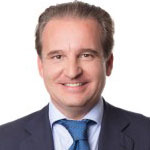 Luis Banciella Rodríguez-Miñón
Profesor
Professor
Licenciado en Derecho por la Universidad Complutense. Diplomado en Ciencias Económicas y Empresariales por la Universidad San Pablo CEU. Abogado del Estado desde el año 2001. Ha sido Secretario General de ENAIRE E.P.E, hasta su nombramiento como Abogado General de la Comunidad de Madrid. Como Abogado del Estado ha ejercido sus funciones en diversos puestos de responsabilidad, entre otros, ha sido Secretario titular del Tribunal Económico-Administrativo Regional de Canarias, Abogado del Estado ante la Audiencia Nacional, específicamente en la Subdirección de Asuntos Europeos e Internacionales ha ejercicio la función de Representación y defensa en juicio del Reino de España ante el Tribunal de Justicia de la Unión Europea, siendo experto Nacional Destacado ante el Servicio Jurídico de la Comisión Europea desde el año 2013 al 2015.
Luis Banciella Rodríguez-Miñón
Profesor
Professor
Licenciado en Derecho por la Universidad Complutense. Diplomado en Ciencias Económicas y Empresariales por la Universidad San Pablo CEU. Abogado del Estado desde el año 2001. Ha sido Secretario General de ENAIRE E.P.E, hasta su nombramiento como Abogado General de la Comunidad de Madrid. Como Abogado del Estado ha ejercido sus funciones en diversos puestos de responsabilidad, entre otros, ha sido Secretario titular del Tribunal Económico-Administrativo Regional de Canarias, Abogado del Estado ante la Audiencia Nacional, específicamente en la Subdirección de Asuntos Europeos e Internacionales ha ejercicio la función de Representación y defensa en juicio del Reino de España ante el Tribunal de Justicia de la Unión Europea, siendo experto Nacional Destacado ante el Servicio Jurídico de la Comisión Europea desde el año 2013 al 2015.
 Jose María Bautista Samaniego
Profesor
Professor
Doctor en Derecho por la Universidad Autónoma de Madrid.
Breve currículum académico y/o investigador: Licenciado y Doctor en Derecho por la Universidad Autónoma de Madrid .Técnico Urbanista (INAP).Máster en Derecho y Administración Local por la Universidad Autónoma de Madrid. Curso de Derecho Inmobiliario Privado en la Escuela de Práctica Jurídica Universidad Complutense de Madrid (año académico).
Jose María Bautista Samaniego
Profesor
Professor
Doctor en Derecho por la Universidad Autónoma de Madrid.
Breve currículum académico y/o investigador: Licenciado y Doctor en Derecho por la Universidad Autónoma de Madrid .Técnico Urbanista (INAP).Máster en Derecho y Administración Local por la Universidad Autónoma de Madrid. Curso de Derecho Inmobiliario Privado en la Escuela de Práctica Jurídica Universidad Complutense de Madrid (año académico).Investigador relacionado:
Derechos fundamentales y libertades púbicas en las Reales Ordenanzas para las Fuerzas Armadas.
El militar ante la función pública: estudio de la Ley 17/1989, de 19 de julio, reguladora del régimen del personal militar profesional.
Plazos para la solicitud del derecho de reversión.
El derecho de reversión a la luz de la Ley 38/1999, de 5 de noviembre, de Ordenación de la Educación.
Urbanismo y Defensa Nacional.
Breve currículum profesional: Cuerpo Jurídico Militar, con destino actual en la Asesoría Jurídica General del Ministerio de Defensa. Con anterioridad: Subdirector General de Patrimonio e Inventario del Ayuntamiento de Madrid. Asesor Jurídico Jefe de la Gerencia de Infraestructura y Equipamiento del Ministerio de Defensa (Hoy INVIED).Secretaría General Técnica del Ministerio de Defensa (Unidad de Estudios Jurídicos).
 Jessica Bayón Pérez
Profesora
Professor
Doctora en Ciencias Sociales con especialidad en Recursos Humanos. Galardonada con la Medalla de Oro al Mérito del Trabajo por la Asociación Europea de Economía y Competitividad. Trayectoria profesional enfocada en Recursos Humanos en el ámbito Sociosanitario. Mejor expediente académico del Grado en Relaciones Laborales y Recursos Humanos con mención en asesoría de empresa. Ello, le faculta a postular el premio a nivel nacional de trayectoria académica por el Ministerio de Educación, Cultura y Deporte. Autora de E-books en el área de empresa: Dirección estratégica de Empresa, Cultura Empresarial y Dirección y Gestión de aeropuertos. Trayectoria en diferentes Universidades en el ámbito Jurídico y Recursos Humanos. Ponente de Conferencias Internacionales, entrevistada en Onda Zero. Estancia postdoctoral en la Universidad de Hamk (Finlandia) y en la Universidad del Istmo (Panamá). Directora de Tesis: La Gestión Estratégica del Talento Humano como Potencial para la Ventaja Competitiva en las Organizaciones Marítimas y Aeroportuarias de Panamá. Universidad del Istmo. Publicaciones Internacionales indexadas en la línea de investigación sobre cómo la inteligencia artificial, robótica y las nuevas tecnologías están afectando a las relaciones laborales y a los derechos fundamentales
Jessica Bayón Pérez
Profesora
Professor
Doctora en Ciencias Sociales con especialidad en Recursos Humanos. Galardonada con la Medalla de Oro al Mérito del Trabajo por la Asociación Europea de Economía y Competitividad. Trayectoria profesional enfocada en Recursos Humanos en el ámbito Sociosanitario. Mejor expediente académico del Grado en Relaciones Laborales y Recursos Humanos con mención en asesoría de empresa. Ello, le faculta a postular el premio a nivel nacional de trayectoria académica por el Ministerio de Educación, Cultura y Deporte. Autora de E-books en el área de empresa: Dirección estratégica de Empresa, Cultura Empresarial y Dirección y Gestión de aeropuertos. Trayectoria en diferentes Universidades en el ámbito Jurídico y Recursos Humanos. Ponente de Conferencias Internacionales, entrevistada en Onda Zero. Estancia postdoctoral en la Universidad de Hamk (Finlandia) y en la Universidad del Istmo (Panamá). Directora de Tesis: La Gestión Estratégica del Talento Humano como Potencial para la Ventaja Competitiva en las Organizaciones Marítimas y Aeroportuarias de Panamá. Universidad del Istmo. Publicaciones Internacionales indexadas en la línea de investigación sobre cómo la inteligencia artificial, robótica y las nuevas tecnologías están afectando a las relaciones laborales y a los derechos fundamentales
 Óscar Bordona Ruiz
Profesor
Professor
Licenciado en Periodismo por la Universidad Complutense de Madrid. Consultor de comunicación, relaciones externas y asuntos públicos con 10 años de experiencia en planificación estratégica, implementación y gestión de campañas y acciones para la promoción de compañías, productos y servicios. Ha trabajado para medios y grupos de comunicación como 20Minutos, Vocento y PRISA creando contenidos especializados para sobre nuevas tecnologías, formación y empleo, seguros, economía y motor, principalmente..
Óscar Bordona Ruiz
Profesor
Professor
Licenciado en Periodismo por la Universidad Complutense de Madrid. Consultor de comunicación, relaciones externas y asuntos públicos con 10 años de experiencia en planificación estratégica, implementación y gestión de campañas y acciones para la promoción de compañías, productos y servicios. Ha trabajado para medios y grupos de comunicación como 20Minutos, Vocento y PRISA creando contenidos especializados para sobre nuevas tecnologías, formación y empleo, seguros, economía y motor, principalmente..
 Eva María Calderón Palomar
Profesor
Professor
Letrada en Ejercicio con Despacho abierto en Madrid, Máster Universitario en Propiedad Intelectual y Derecho de las Nuevas Tecnologías (UNIR) y Doctoranda en Derecho (UCJC).
Socia fundadora de Epiqueya Abogados, Sánchez y Calderón y de los proyectos Sicumple.com y Divornet.com.
Miembro de ENATIC (Asociación de Expertos Nacionales de la Abogacía TIC), con artículos publicados en el Blog de la Abogacía Española, Blog de Enatic y en La Ley.
Eva María Calderón Palomar
Profesor
Professor
Letrada en Ejercicio con Despacho abierto en Madrid, Máster Universitario en Propiedad Intelectual y Derecho de las Nuevas Tecnologías (UNIR) y Doctoranda en Derecho (UCJC).
Socia fundadora de Epiqueya Abogados, Sánchez y Calderón y de los proyectos Sicumple.com y Divornet.com.
Miembro de ENATIC (Asociación de Expertos Nacionales de la Abogacía TIC), con artículos publicados en el Blog de la Abogacía Española, Blog de Enatic y en La Ley.
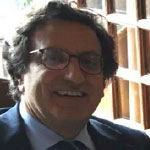 Javier Cepeda Morras
Profesor
Professor
Responsable de los Servicios Jurídicos de Naturgy desde 2015. Ingreso por oposición en el Cuerpo especial de Letrados de la Comunidad de Madrid ( Mayo 2000). Letrado del Servicio Jurídico de Presidencia de la Comunidad de Madrid, (Mayo 2000- Diciembre 2001). Vocal Asesor de la Secretaría General Técnica del Ministerio de Medio Ambiente (Enero 2002-Julio 2002). Director del Gabinete Técnico del Subsecretario del Ministerio de Trabajo (Julio 2002-Junio 2003). Secretario General Técnico del Ministerio de Trabajo y Asuntos Sociales desde Junio del 2003 a Abril 2004. Subdirector General de lo Consultivo de la Dirección General de los Servicios Jurídicos de la Comunidad de Madrid (Desde Septiembre 2004 hasta 2010). Licenciado en Derecho por la Universidad de Navarra (Junio 1992). Doctor en Derecho. Master por el IESE en el programa "Liderazgo de Gestión Pública 2004-2005. Miembro del Consejo Académico de FIDE.
Javier Cepeda Morras
Profesor
Professor
Responsable de los Servicios Jurídicos de Naturgy desde 2015. Ingreso por oposición en el Cuerpo especial de Letrados de la Comunidad de Madrid ( Mayo 2000). Letrado del Servicio Jurídico de Presidencia de la Comunidad de Madrid, (Mayo 2000- Diciembre 2001). Vocal Asesor de la Secretaría General Técnica del Ministerio de Medio Ambiente (Enero 2002-Julio 2002). Director del Gabinete Técnico del Subsecretario del Ministerio de Trabajo (Julio 2002-Junio 2003). Secretario General Técnico del Ministerio de Trabajo y Asuntos Sociales desde Junio del 2003 a Abril 2004. Subdirector General de lo Consultivo de la Dirección General de los Servicios Jurídicos de la Comunidad de Madrid (Desde Septiembre 2004 hasta 2010). Licenciado en Derecho por la Universidad de Navarra (Junio 1992). Doctor en Derecho. Master por el IESE en el programa "Liderazgo de Gestión Pública 2004-2005. Miembro del Consejo Académico de FIDE.
 Susana Checa Prieto
Profesora
Professor
Letrada Asesor de Empresas (E1 – ICADE) y Doctorado en Derecho, premio extraordinario Tesis Doctoral Ciencias Sociales 2016 (Universidad Nebrija).
Susana Checa Prieto
Profesora
Professor
Letrada Asesor de Empresas (E1 – ICADE) y Doctorado en Derecho, premio extraordinario Tesis Doctoral Ciencias Sociales 2016 (Universidad Nebrija). Durante 16 años ha prestado sus servicios en distintos departamentos del Centro Español de Derechos Reprográficos, siendo su última posición Directora de Servicios a los Socios y Estrategia, liderando la internacionalización de la asociación.
Además es Máster en Derecho de las Tecnologías de la Información y las Comunicaciones (ICADE) y Máster de Edición (Universidad de Alcalá).
Actualmente es profesora de EAE, profesora titular de Nuevas Tecnologías en la Universidad Antonio de Nebrija y colabora como PDI con la Universidad Internacional de La Rioja y la Universidad Complutense.
Es autora única de la monografía “La explotación comercial de las obras huérfanas” (Ed. Tirant Lo Blanch, 2017) y coautora de varios libros, así como de numerosos artículos divulgativos y de investigación sobre modelos de negocio en el ámbito de la Propiedad Intelectual.
Representante española del sector editorial ante organizaciones internacionales como IFRRO y PDLN.
 María Contín Trillo Figueroa
Profesora
Professor
Doctora en Derecho por la Universidad de Zaragoza en 2019. Licenciada por la Universidad de Zaragoza en 2001. En 2005 supero el concurso-oposición para ingresar en el Cuerpo Jurídico Militar, ejerciendo funciones de asesoramiento y fundamentalmente en Justicia, como fiscal. Ha realizado diversas publicaciones jurídicas y es profesora colaboradora de la Universidad Pontificia de Comillas en el área de Derecho Procesal desde 2011, y en la Universidad de Nebrija en Derecho Civil.
María Contín Trillo Figueroa
Profesora
Professor
Doctora en Derecho por la Universidad de Zaragoza en 2019. Licenciada por la Universidad de Zaragoza en 2001. En 2005 supero el concurso-oposición para ingresar en el Cuerpo Jurídico Militar, ejerciendo funciones de asesoramiento y fundamentalmente en Justicia, como fiscal. Ha realizado diversas publicaciones jurídicas y es profesora colaboradora de la Universidad Pontificia de Comillas en el área de Derecho Procesal desde 2011, y en la Universidad de Nebrija en Derecho Civil.
 Beatriz Corredor Sierra
Profesora
Professor
Licenciada en Derecho por la Universidad Autónoma de Madrid, es registradora de la propiedad desde 1993. En 2008 fue nombrada ministra de Vivienda en la IX Legislatura, bajo el gobierno de José Luis Rodríguez Zapatero. Ha sido diputada del Congreso de los Diputados y presidenta de la Comisión de Justicia desde 2019. Desde septiembre de 2018 es presidenta y directora de la Fundación Pablo Iglesias. En la actualidad preside Red Eléctrica de España. En junio de 2020 fue nombrada vicepresidenta del Patronato del Museo Nacional Centro de Arte Reina Sofía.
Beatriz Corredor Sierra
Profesora
Professor
Licenciada en Derecho por la Universidad Autónoma de Madrid, es registradora de la propiedad desde 1993. En 2008 fue nombrada ministra de Vivienda en la IX Legislatura, bajo el gobierno de José Luis Rodríguez Zapatero. Ha sido diputada del Congreso de los Diputados y presidenta de la Comisión de Justicia desde 2019. Desde septiembre de 2018 es presidenta y directora de la Fundación Pablo Iglesias. En la actualidad preside Red Eléctrica de España. En junio de 2020 fue nombrada vicepresidenta del Patronato del Museo Nacional Centro de Arte Reina Sofía.
 Alfredo Dagnino Guerra
Profesor
Professor
Letrado del Consejo de Estado Abogado – Letrado asesor de empresas profesor de universidad y centros de postgrado
Abogado ejerciente del Ilustre Colegio de Abogados de Madrid (desde 1995).
En el desempeño de la condición de abogado y consultor ha venido prestando servicios profesionales de asesoramiento jurídico (consultivo y contencioso) y consultoría en firmas de reconocido prestigio nacional e internacional.
Letrado Asesor de organizaciones empresariales en diversos sectores económicos, Gestión de empresas e instituciones, Presidente Ejecutivo de la Fundación Universitaria San Pablo CEU y Gran Canciller de las Universidades CEU (2006-2011), Presidente Ejecutivo de la Fundación Intereconomía (2011-2013), Consejero Ejecutivo del Grupo Intereconomía (2011-2012).
Alfredo Dagnino Guerra
Profesor
Professor
Letrado del Consejo de Estado Abogado – Letrado asesor de empresas profesor de universidad y centros de postgrado
Abogado ejerciente del Ilustre Colegio de Abogados de Madrid (desde 1995).
En el desempeño de la condición de abogado y consultor ha venido prestando servicios profesionales de asesoramiento jurídico (consultivo y contencioso) y consultoría en firmas de reconocido prestigio nacional e internacional.
Letrado Asesor de organizaciones empresariales en diversos sectores económicos, Gestión de empresas e instituciones, Presidente Ejecutivo de la Fundación Universitaria San Pablo CEU y Gran Canciller de las Universidades CEU (2006-2011), Presidente Ejecutivo de la Fundación Intereconomía (2011-2013), Consejero Ejecutivo del Grupo Intereconomía (2011-2012).
 Javier de Miguel Saavedra
Profesor
Professor
Manager del Área de Privacidad y Protección de datos.
Javier de Miguel Saavedra
Profesor
Professor
Manager del Área de Privacidad y Protección de datos.
Cuenta con más de diez años de experiencia en el asesoramiento a empresas nacionales e internacionales en materia de derecho tecnológico, concretamente en privacidad y protección de Datos, Open Banking, marketing digital y comercio electrónico.
Certified Data Privacy Solutions Engineer (CDPSE) por ISACA y OneTrust Certified Professional por OneTrust.
Actual co-director del Madrid Knowledgenet Chapter de la International Association of Privacy Professionals (IAPP), de la que forma parte, y miembro del Ilustre Colegio de Abogados de Madrid. Licenciado en Derecho y Máster en Derecho de las Telecomunicaciones, Internet y Audiovisual.
Coordinador y profesor en distintos programas formativos en la Universidad Nebrija. Asimismo, es colaborador en radio y prensa jurídica especializada.
 Fernando Díaz Marroquín
Profesor
Professor
Licenciado en Derecho por la Universidad Autónoma de Madrid (1997). Abogado perteneciente al Ilustre Colegio de Abogados de Madrid desde 1999. Ha desarrollado su carrera en diversos despachos especializados en derecho societario y mercantil, habiendo sido socio de las firmas Baker & Mckenzie, SLP, y Ramón y Cajal Abogados, asesorando en operaciones de inversión y desinversión, gobierno corporativo, mercado de valores, contratación mercantil, reestructuraciones societarias, fusiones y escisiones, transmisión de carteras de crédito, etcétera, en diversos sectores, tales como industrial, energía, servicios, financiero y alimentación. Igualmente, su labor ha sido reconocida por diversas publicaciones (Best Lawyers in Spain 2014 en la práctica de Banking and Finance Law, The Legal 500 Spain en la práctica de Corporate and M&A, y su inclusión en el ranking de Expansión Jurídico (2015) de los cincuenta abogados más activos en España en fusiones y adquisiciones). En la actualidad es director de la asesoría jurídica de Tecnatom, S.A., multinacional española que desarrolla su actividad en los sectores de energía nuclear y aeronáutica. Colabora en distintas publicaciones jurídicas e imparte docencia en el Máster de Derecho de la Empresa y del Máster de Acceso a la Abogacía y a la Procura de la Escuela de Negocios de la Universidad Antonio de Nebrija de Madrid.
Fernando Díaz Marroquín
Profesor
Professor
Licenciado en Derecho por la Universidad Autónoma de Madrid (1997). Abogado perteneciente al Ilustre Colegio de Abogados de Madrid desde 1999. Ha desarrollado su carrera en diversos despachos especializados en derecho societario y mercantil, habiendo sido socio de las firmas Baker & Mckenzie, SLP, y Ramón y Cajal Abogados, asesorando en operaciones de inversión y desinversión, gobierno corporativo, mercado de valores, contratación mercantil, reestructuraciones societarias, fusiones y escisiones, transmisión de carteras de crédito, etcétera, en diversos sectores, tales como industrial, energía, servicios, financiero y alimentación. Igualmente, su labor ha sido reconocida por diversas publicaciones (Best Lawyers in Spain 2014 en la práctica de Banking and Finance Law, The Legal 500 Spain en la práctica de Corporate and M&A, y su inclusión en el ranking de Expansión Jurídico (2015) de los cincuenta abogados más activos en España en fusiones y adquisiciones). En la actualidad es director de la asesoría jurídica de Tecnatom, S.A., multinacional española que desarrolla su actividad en los sectores de energía nuclear y aeronáutica. Colabora en distintas publicaciones jurídicas e imparte docencia en el Máster de Derecho de la Empresa y del Máster de Acceso a la Abogacía y a la Procura de la Escuela de Negocios de la Universidad Antonio de Nebrija de Madrid.
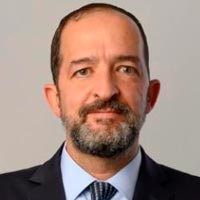 Fernando Díez Estella
Profesor
Professor
Licenciado en Derecho y en Ciencias Económicas y Empresariales por la Universidad Pontificia de Comillas (ICADE, E-3), y Doctor en Derecho Mercantil por la Universidad Autónoma de Madrid. Ha realizado estancias de investigación en la Harvard Law School (Cambridge) y en la DG COMP (Bruselas). Ha impartido docencia en Cursos de Postgrado y Masteres Universitarios en el Centro de Estudios Garrigues, Instituto de Empresa, el Instituto Ortega y Gasset y la Universidad San Pablo CEU. Su labor investigadora se desarrolla fundamentalmente en el ámbito del Derecho y la Economía de la Competencia. Colabora en distintas publicaciones jurídicas y es miembro del Consejo de Redacción de la Revista de Competencia, Distribución y Consumo y la Gaceta Jurídica de la Competencia y la UE. Pertenece a la Junta Directiva de la AEDC (Asociación Española para la Defensa de la Competencia) y es Académico Correspondiente de la Real Academia de Jurisprudencia y Legislación. Desde el Curso 2008/09 acreditado por la ANECA como Profesor Contratado Doctor.
Fernando Díez Estella
Profesor
Professor
Licenciado en Derecho y en Ciencias Económicas y Empresariales por la Universidad Pontificia de Comillas (ICADE, E-3), y Doctor en Derecho Mercantil por la Universidad Autónoma de Madrid. Ha realizado estancias de investigación en la Harvard Law School (Cambridge) y en la DG COMP (Bruselas). Ha impartido docencia en Cursos de Postgrado y Masteres Universitarios en el Centro de Estudios Garrigues, Instituto de Empresa, el Instituto Ortega y Gasset y la Universidad San Pablo CEU. Su labor investigadora se desarrolla fundamentalmente en el ámbito del Derecho y la Economía de la Competencia. Colabora en distintas publicaciones jurídicas y es miembro del Consejo de Redacción de la Revista de Competencia, Distribución y Consumo y la Gaceta Jurídica de la Competencia y la UE. Pertenece a la Junta Directiva de la AEDC (Asociación Española para la Defensa de la Competencia) y es Académico Correspondiente de la Real Academia de Jurisprudencia y Legislación. Desde el Curso 2008/09 acreditado por la ANECA como Profesor Contratado Doctor.
 Cristina Fernandez Herrero
Profesora
Professor
Desde el año 1990 comencé a ejercer mi profesión. Posteriormente, en 1992, fundé Estudio Legal Vallehermoso, S.L., como experta en Derecho de Familia, que es donde ejerzo mi profesión en la actualidad. Durante todos estos años, mi formación ha sido continuada, y me ha permitido alcanzar un alto grado, tanto teórico como practico, de especialización. Principalmente, ejerzo como Abogada de Familia y experta en Mediación, además de formar parte del elenco de abogados del Tribunal de la Rota.
Mi experiencia en el campo docente ha sido en colaboración con la Catedrática en Derecho Civil de la U.C.M. Doña Matilde Cuena Casas, en los cursos de derecho civil IV en el año 2008/2009 y 2009/2010, e impartiendo en el Master de Derecho Privado, la parte práctica de derecho de familia, en los cursos 2.012/2.013, 2.013/2.014 a la actualidad. Además, he impartido un curso de Testamentaria y Herencias en la Universidad Europea
Asimismo, he publicado el libro "El divorcio, una explicación sencilla", editado por la editorial GESFOMEDIA.
Cristina Fernandez Herrero
Profesora
Professor
Desde el año 1990 comencé a ejercer mi profesión. Posteriormente, en 1992, fundé Estudio Legal Vallehermoso, S.L., como experta en Derecho de Familia, que es donde ejerzo mi profesión en la actualidad. Durante todos estos años, mi formación ha sido continuada, y me ha permitido alcanzar un alto grado, tanto teórico como practico, de especialización. Principalmente, ejerzo como Abogada de Familia y experta en Mediación, además de formar parte del elenco de abogados del Tribunal de la Rota.
Mi experiencia en el campo docente ha sido en colaboración con la Catedrática en Derecho Civil de la U.C.M. Doña Matilde Cuena Casas, en los cursos de derecho civil IV en el año 2008/2009 y 2009/2010, e impartiendo en el Master de Derecho Privado, la parte práctica de derecho de familia, en los cursos 2.012/2.013, 2.013/2.014 a la actualidad. Además, he impartido un curso de Testamentaria y Herencias en la Universidad Europea
Asimismo, he publicado el libro "El divorcio, una explicación sencilla", editado por la editorial GESFOMEDIA.
 Josefa Fernandez Vidal
Profesora
Professor
Máster Universitario de Acceso a la Abogacía por la Universidad Católica San Antonio
de Murcia, Graduada en Derecho por la Universidad Católica San Antonio de Murcia y
Diplomada en Gestión y Administración Pública por la Facultad de Derecho de la
Universidad de Murcia. Abogada Ejerciente del Ilustre Colegio de Abogados de Murcia.
Vinculada a la investigación y formación como doctoranda. Es autora del capítulo “La
Mediación Penal Juvenil” en el libro Proceso, métodos complementarios o alternativos
para la solución de conflictos y nuevas tecnologías para una justicia más garantista y
autora del capítulo “La apostilla electrónica, lexnet y el expediente electrónico en el
ámbito judicial”, en el libro Proceso civil y nuevas tecnologías. Su inquietud por la
permanente formación y actualización le ha llevado a realizar numerosos cursos y
seminarios de formación y especialización en el ámbito de las ciencias jurídicas.
Josefa Fernandez Vidal
Profesora
Professor
Máster Universitario de Acceso a la Abogacía por la Universidad Católica San Antonio
de Murcia, Graduada en Derecho por la Universidad Católica San Antonio de Murcia y
Diplomada en Gestión y Administración Pública por la Facultad de Derecho de la
Universidad de Murcia. Abogada Ejerciente del Ilustre Colegio de Abogados de Murcia.
Vinculada a la investigación y formación como doctoranda. Es autora del capítulo “La
Mediación Penal Juvenil” en el libro Proceso, métodos complementarios o alternativos
para la solución de conflictos y nuevas tecnologías para una justicia más garantista y
autora del capítulo “La apostilla electrónica, lexnet y el expediente electrónico en el
ámbito judicial”, en el libro Proceso civil y nuevas tecnologías. Su inquietud por la
permanente formación y actualización le ha llevado a realizar numerosos cursos y
seminarios de formación y especialización en el ámbito de las ciencias jurídicas.
 Tomás Fernández Villazala
Profesor
Professor
Doctor en Derecho por la Universidad Nacional de Educación a Distancia (UNED). Es Licenciado en Derecho por la Universidad de Valladolid (UVA), Graduado en Psicología en la Universidad Nacional de Educación a Distancia (UNED) y Graduado en Criminología por la Universidad Católica San Antonio de Murcia (UCAM). Igualmente citar que es profesor colaborador en varias Universidades y tiene diversas publicaciones principalmente en el campo del Derecho y la Criminología.
Tomás Fernández Villazala
Profesor
Professor
Doctor en Derecho por la Universidad Nacional de Educación a Distancia (UNED). Es Licenciado en Derecho por la Universidad de Valladolid (UVA), Graduado en Psicología en la Universidad Nacional de Educación a Distancia (UNED) y Graduado en Criminología por la Universidad Católica San Antonio de Murcia (UCAM). Igualmente citar que es profesor colaborador en varias Universidades y tiene diversas publicaciones principalmente en el campo del Derecho y la Criminología.
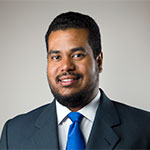 Luis Armando García Segura
Profesor
Professor
Doctor en Derecho por la Universidad Nebrija, Sobresaliente Cum Laude, 2015. Máster en Derecho Empresarial por la Universidad Nebrija, 2009. Licenciado en Derecho por la Pontificia Universidad Católica Madre y Maestra de Santo Domingo en el año 2007, Cum Laude. Ha trabajado tanto para el sector público como privado en temas de educación y Derecho. Coordinador de la Cátedra Global Nebrija-Santander en gestión de riesgos y conflictos; Director del Club de Cultura de Defensa, así como Director del Máster Universitario en protección datos y seguridad de la Universidad Nebrija. En el ámbito profesional, es Certified Data Privacy Professional (CDPP) y abogado en ejercicio; miembro de la International Association of Privacy Professionals (IAPP); miembro de la Asociación Española para el Fomento de la Seguridad de la Información (ISMS Forum); miembro de la Asociación Española de Derecho del Entretenimiento (DENAE) y miembro asociado de la American Bar Association (ABA).
Luis Armando García Segura
Profesor
Professor
Doctor en Derecho por la Universidad Nebrija, Sobresaliente Cum Laude, 2015. Máster en Derecho Empresarial por la Universidad Nebrija, 2009. Licenciado en Derecho por la Pontificia Universidad Católica Madre y Maestra de Santo Domingo en el año 2007, Cum Laude. Ha trabajado tanto para el sector público como privado en temas de educación y Derecho. Coordinador de la Cátedra Global Nebrija-Santander en gestión de riesgos y conflictos; Director del Club de Cultura de Defensa, así como Director del Máster Universitario en protección datos y seguridad de la Universidad Nebrija. En el ámbito profesional, es Certified Data Privacy Professional (CDPP) y abogado en ejercicio; miembro de la International Association of Privacy Professionals (IAPP); miembro de la Asociación Española para el Fomento de la Seguridad de la Información (ISMS Forum); miembro de la Asociación Española de Derecho del Entretenimiento (DENAE) y miembro asociado de la American Bar Association (ABA). Ha sido autor de diversos artículos y libros, entre los que destacan:
- The necessary link between security culture and data protection in the European Union en Ramírez, J.M. & Biziewski, J. (Eds.). (2020). A shift in the Security Paradigm. Londres: Springer.
- Retos jurídicos de los vehículos conectados en la era del internet de las cosas. Boletín Mexicano de Derecho Comparado, año LI, núm. 154, enero-abril de 2019, pp. 457-488.
- Cyberspace: risks and benefits for society (Ed.) (2017). Editorial Springer.
- Diseño, creación y administración de un despacho de Abogados (2016). Editorial Thomson Reuters
 César Giner Alegría
Profesor
Professor
Doctor en el Programa de Abogacía y Práctica Jurídica y Licenciado en Criminología y Psicología.
Profesor en la Universidad Católica San Antonio de Murcia en los Departamentos de Criminología y Derecho. EN Grupo IOE – Universidad de Alcalá de Henares Profesor del Curso de Experto en Perito Judicial en Prevención de Riesgos Laborales y del Máster en Criminología desde 2011. En la Universidad CEPES (México) profesor del Programa de doctorado de Docencia e Investigación.
Autor de numerosos artículos científicos publicados en Anales del Derecho, Tirant lo Blanch y Aranzadi, así como, de Manuales y Capítulos de Libros en las editoriales Aranzadi y Tirant lo Blanch.
Proyectos de Investigación con la Fundación de Victimología y estancias de investigación en México.
César Giner Alegría
Profesor
Professor
Doctor en el Programa de Abogacía y Práctica Jurídica y Licenciado en Criminología y Psicología.
Profesor en la Universidad Católica San Antonio de Murcia en los Departamentos de Criminología y Derecho. EN Grupo IOE – Universidad de Alcalá de Henares Profesor del Curso de Experto en Perito Judicial en Prevención de Riesgos Laborales y del Máster en Criminología desde 2011. En la Universidad CEPES (México) profesor del Programa de doctorado de Docencia e Investigación.
Autor de numerosos artículos científicos publicados en Anales del Derecho, Tirant lo Blanch y Aranzadi, así como, de Manuales y Capítulos de Libros en las editoriales Aranzadi y Tirant lo Blanch.
Proyectos de Investigación con la Fundación de Victimología y estancias de investigación en México.
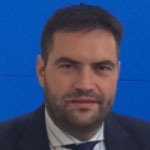 Daniel Gómez de Arriba
Profesor
Professor
Licenciado por la Universidad Pontificia de Comillas ICADE y programa executive de IE Law School de Start Up Lawyers, Daniel es abogado del ICAM con más de 20 años de experiencia en la práctica del Derecho, especializado en el área del Derecho Mercantil y, en especial, en su vertiente del Derecho Concursal (administrador concursal y miembro de ASPAC). Además, su especialización mercantil, su formación especializada y su pasión por la innovación le han llevado a asesorar a múltiples start ups y emprendedores . También ha desarrollado asesoramiento integral en su otra gran pasión: el sector deportes y entretenimiento.
Concretamente, en el ámbito deportivo ha venido asesorando jurídicamente a clubes de fútbol como el Getafe S.A.D. y el Benidorm C.F., y ha intervenido en la elaboración de acuerdos entre destacados agentes deportivos como el Swansea City Association F.C., Norwich City F.C., Football Club Internazionale Milano S.P.A., Joma Sport S.A., Málaga, S.A.D., Federación Española de Boxeo, Federación de Fútbol de Costa de Marfil y Federación Internacional de Tenis (ITF).
Asimismo, ha impartido la docencia en el Máster de Derecho Deportivo de la Fundación Estudiantes – Gómez Acebo y Pombo, y es profesor de Master en ISDE Law & Business School y en la Escuela de Organización Industrial (EOI).
Daniel Gómez de Arriba
Profesor
Professor
Licenciado por la Universidad Pontificia de Comillas ICADE y programa executive de IE Law School de Start Up Lawyers, Daniel es abogado del ICAM con más de 20 años de experiencia en la práctica del Derecho, especializado en el área del Derecho Mercantil y, en especial, en su vertiente del Derecho Concursal (administrador concursal y miembro de ASPAC). Además, su especialización mercantil, su formación especializada y su pasión por la innovación le han llevado a asesorar a múltiples start ups y emprendedores . También ha desarrollado asesoramiento integral en su otra gran pasión: el sector deportes y entretenimiento.
Concretamente, en el ámbito deportivo ha venido asesorando jurídicamente a clubes de fútbol como el Getafe S.A.D. y el Benidorm C.F., y ha intervenido en la elaboración de acuerdos entre destacados agentes deportivos como el Swansea City Association F.C., Norwich City F.C., Football Club Internazionale Milano S.P.A., Joma Sport S.A., Málaga, S.A.D., Federación Española de Boxeo, Federación de Fútbol de Costa de Marfil y Federación Internacional de Tenis (ITF).
Asimismo, ha impartido la docencia en el Máster de Derecho Deportivo de la Fundación Estudiantes – Gómez Acebo y Pombo, y es profesor de Master en ISDE Law & Business School y en la Escuela de Organización Industrial (EOI).
 Almudena Gomiz
Profesora
Professor
Profa. Dª Almudena Gomiz Macein, Licenciada en Derecho por la Universidad Complutense de Madrid. Graduado Superior en Ciencias del Patrimonio Especialidad en Protección y Gestión por la Universidad SEK. Experta Universitaria en Fundaciones, aspectos jurídicos y fiscales, por la UNED. Máster en Seguridad y Defensa por la Universidad NEBRIJA.
Almudena Gomiz
Profesora
Professor
Profa. Dª Almudena Gomiz Macein, Licenciada en Derecho por la Universidad Complutense de Madrid. Graduado Superior en Ciencias del Patrimonio Especialidad en Protección y Gestión por la Universidad SEK. Experta Universitaria en Fundaciones, aspectos jurídicos y fiscales, por la UNED. Máster en Seguridad y Defensa por la Universidad NEBRIJA. Abogado ejerciente, colegiada desde 1.990 en I.C.A.M. Socia fundadora de ALARTE ABOGADOS despacho especializado y dedicado al sector del arte, para clientes nacionales e internacionales, donde actualmente desempeña su trabajo de abogado y directora de la Firma.
Profesora en la Facultad de Derecho de la Universidad Antonio de Nebrija impartiendo asignaturas de Introducción y cuestiones generales en Derecho Procesal y Derecho Procesal y Litigación Civil. Organizadora y ponente en cursos de formación, congresos, charlas, jornadas y mesas redondas impartidos en instituciones de diversa índole. Publicación de artículos y de ponencias en materia de regulación jurídica y ejercicio de la abogacía
 Víctor de Gregorio Alcaide
Profesor
Professor
Profesor Universidad Nebrija, Abogado, socio fundador de SLEY Abogados, Áreas de trabajo, Derecho Mercantil, Derecho Administrativo y Derecho Penal. Licenciado en Derecho por la U.E.M., Máster en Derecho Empresarial por la U. Nebrija, Licenciado en Ciencias del Trabajo por la U.O.C., Licenciado en Ciencias Políticas por la U.C.M., Licenciado en Sociología por la U.C.M. y Certificado de Docencia del Doctorado en Ciencias Políticas y de la Administración en el programa de Procesos Políticos en la Unión Europea y Europa de Este por la U.N.E.D.
Víctor de Gregorio Alcaide
Profesor
Professor
Profesor Universidad Nebrija, Abogado, socio fundador de SLEY Abogados, Áreas de trabajo, Derecho Mercantil, Derecho Administrativo y Derecho Penal. Licenciado en Derecho por la U.E.M., Máster en Derecho Empresarial por la U. Nebrija, Licenciado en Ciencias del Trabajo por la U.O.C., Licenciado en Ciencias Políticas por la U.C.M., Licenciado en Sociología por la U.C.M. y Certificado de Docencia del Doctorado en Ciencias Políticas y de la Administración en el programa de Procesos Políticos en la Unión Europea y Europa de Este por la U.N.E.D.
 Julio Guinea Bonillo
Profesor
Professor
Licenciado en Historia y Graduado en Ciencias Políticas por la Universidad Complutense, Máster en Unión Europea por la Universidad CEU San Pablo y en Diplomacia y Relaciones Internacionales por la Escuela Diplomática de España. Es también Doctor en Derecho por UDIMA con una tesis que versa sobre la Articulación Jurídica de la Política Exterior y de Seguridad Común y de la Política Común de Seguridad y Defensa.
Julio Guinea Bonillo
Profesor
Professor
Licenciado en Historia y Graduado en Ciencias Políticas por la Universidad Complutense, Máster en Unión Europea por la Universidad CEU San Pablo y en Diplomacia y Relaciones Internacionales por la Escuela Diplomática de España. Es también Doctor en Derecho por UDIMA con una tesis que versa sobre la Articulación Jurídica de la Política Exterior y de Seguridad Común y de la Política Común de Seguridad y Defensa.
 Patricia Ibáñez Ibáñez
Profesora
Professor
Licenciada en Psicopedagogía, Máster Universitario en Investigación en Ciencias Sociales y Jurídicas, Máster Universitario en Igualdad de Género en el ámbito público y privado. Doctoranda (Universidad de Extremadura) en la línea de investigación de TICs y Formación del profesorado. Actualmente, imparte docencia en el master de Acceso a la Abogacía y a la Procura en la materia Técnicas de Investigación Jurídica y es gestora e-learning de Global Campus Nebrija, unidad de formación online y blended de la Universidad Nebrija. Además, pertenece al Grupo de Investigación Cognición, Educación y Diferencias Individuales (CEDI) de la Universidad Nebrija.
Patricia Ibáñez Ibáñez
Profesora
Professor
Licenciada en Psicopedagogía, Máster Universitario en Investigación en Ciencias Sociales y Jurídicas, Máster Universitario en Igualdad de Género en el ámbito público y privado. Doctoranda (Universidad de Extremadura) en la línea de investigación de TICs y Formación del profesorado. Actualmente, imparte docencia en el master de Acceso a la Abogacía y a la Procura en la materia Técnicas de Investigación Jurídica y es gestora e-learning de Global Campus Nebrija, unidad de formación online y blended de la Universidad Nebrija. Además, pertenece al Grupo de Investigación Cognición, Educación y Diferencias Individuales (CEDI) de la Universidad Nebrija.
 M. Caterina La Barbera
Profesora
Professor
Doctora en Derechos Humanos por la Universidad de Palermo, Italia. Ha tenido experiencia docente e investigadora en instituciones españolas y extranjeras, entre las cuales la Universidad de Palermo, la Universidad de California-Berkeley, el Centro de Ciencias Humanas y Sociales del CSIC, el Centro de Estudios Políticos y Constitucionales, la UNED y la Universidad Carlos III de Madrid. Está acreditada como Profesora Contratada Doctora y Profesora de Universidad Privada por la ANECA. Ha sido investigadora principal de proyectos de investigación competitivos, dentro de los estudios críticos del derecho y las políticas públicas, abarcando los derechos humanos en la intersección entre igualdad de género y diversidad cultural, y los conflictos materiales y discursivos que se articulan entorno a estos dos ejes fundamentales. Es autora de la monografía “Multicentered Feminism” (Compostampa 2009) y ha editado los volúmenes “Identity and Migration in Europe” (Springer 2015) e “Igualdad de género y no discriminación en España” (CEPC 2016). Cuenta además con numerosas publicaciones en revistas indexadas y capítulos de libros en inglés, español e italiano. Para más información: https://nebrija.academia.edu/MariaCaterinaLaBarbera.
M. Caterina La Barbera
Profesora
Professor
Doctora en Derechos Humanos por la Universidad de Palermo, Italia. Ha tenido experiencia docente e investigadora en instituciones españolas y extranjeras, entre las cuales la Universidad de Palermo, la Universidad de California-Berkeley, el Centro de Ciencias Humanas y Sociales del CSIC, el Centro de Estudios Políticos y Constitucionales, la UNED y la Universidad Carlos III de Madrid. Está acreditada como Profesora Contratada Doctora y Profesora de Universidad Privada por la ANECA. Ha sido investigadora principal de proyectos de investigación competitivos, dentro de los estudios críticos del derecho y las políticas públicas, abarcando los derechos humanos en la intersección entre igualdad de género y diversidad cultural, y los conflictos materiales y discursivos que se articulan entorno a estos dos ejes fundamentales. Es autora de la monografía “Multicentered Feminism” (Compostampa 2009) y ha editado los volúmenes “Identity and Migration in Europe” (Springer 2015) e “Igualdad de género y no discriminación en España” (CEPC 2016). Cuenta además con numerosas publicaciones en revistas indexadas y capítulos de libros en inglés, español e italiano. Para más información: https://nebrija.academia.edu/MariaCaterinaLaBarbera.
 Javier Lacleta Michelena
Profesor
Professor
Licenciado en Derecho por el CEU, master en el Institut de Droit Européen de Bruselas. Abogado. Socio de MAIO y abogado recomendado por CHAMBERS®.
Javier Lacleta Michelena
Profesor
Professor
Licenciado en Derecho por el CEU, master en el Institut de Droit Européen de Bruselas. Abogado. Socio de MAIO y abogado recomendado por CHAMBERS®.
 Antonio Linares Gutiérrez
Profesor
Professor
Doctor en Derecho. Universidad de Córdoba
Licenciado en Derecho, Universidad Autónoma de Madrid, 1989.
DEA en Derecho (Derecho y Nuevas Tecnologías) UNED.
Académico correspondiente Real Academia Española de Jurisprudencia y Legislación.
Profesor colaborador LA LEY WOLTERS KLUWER
Profesor titular en la Universidad de San Gregorio de Portoviejo
Ponente habitual en la D.G. Comercio de la Comunidad de Madrid, Ayuntamiento de Madrid y Colegio de Abogados de Madrid.
Publicaciones científicas/ jurídica revista Dereito (USCV), Universidad Francisco de Vitoria, Edit. Sepin,
Autor de cursos jurídicos para la Fundación Tripartita.
Tribunal Supremo, Madrid, Sala Civil, 1.985 – 1991.
Abogado desde octubre de 1.991 en despacho profesional propio, especializado en asuntos mercantiles, civiles, familia, consumo y nuevas tecnologías
Árbitro/ Mediador en la JAC Comunidad de Madrid y Ayuntamiento de Madrid
Despacho Jurídico Alfa 3, Junio 2008 – Julio 2009.
Contador - Partidor. Perito en Juzgados de Primera Instancia y Familia.
Mediador civil y mercantil (ICAM).
Secretario del Consejo de Administración de diversas asociaciones del sector del metal.
Antonio Linares Gutiérrez
Profesor
Professor
Doctor en Derecho. Universidad de Córdoba
Licenciado en Derecho, Universidad Autónoma de Madrid, 1989.
DEA en Derecho (Derecho y Nuevas Tecnologías) UNED.
Académico correspondiente Real Academia Española de Jurisprudencia y Legislación.
Profesor colaborador LA LEY WOLTERS KLUWER
Profesor titular en la Universidad de San Gregorio de Portoviejo
Ponente habitual en la D.G. Comercio de la Comunidad de Madrid, Ayuntamiento de Madrid y Colegio de Abogados de Madrid.
Publicaciones científicas/ jurídica revista Dereito (USCV), Universidad Francisco de Vitoria, Edit. Sepin,
Autor de cursos jurídicos para la Fundación Tripartita.
Tribunal Supremo, Madrid, Sala Civil, 1.985 – 1991.
Abogado desde octubre de 1.991 en despacho profesional propio, especializado en asuntos mercantiles, civiles, familia, consumo y nuevas tecnologías
Árbitro/ Mediador en la JAC Comunidad de Madrid y Ayuntamiento de Madrid
Despacho Jurídico Alfa 3, Junio 2008 – Julio 2009.
Contador - Partidor. Perito en Juzgados de Primera Instancia y Familia.
Mediador civil y mercantil (ICAM).
Secretario del Consejo de Administración de diversas asociaciones del sector del metal.
 Begoña Lluva Rivera
Profesora
Professor
Profesor del área de Derecho y Seguridad. Procurador de los Tribunales y con despacho propio desde el año 1993. Mediadora Familiar, Civil, Mercantil y Tráfico. Doctor en Derecho por la UNED en el año 2000.
Begoña Lluva Rivera
Profesora
Professor
Profesor del área de Derecho y Seguridad. Procurador de los Tribunales y con despacho propio desde el año 1993. Mediadora Familiar, Civil, Mercantil y Tráfico. Doctor en Derecho por la UNED en el año 2000.
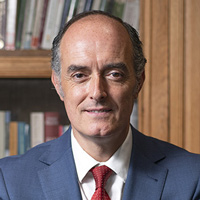 Alfonso Lopez de la Osa Escribano
Profesor
Professor
Decano y profesor de la Facultad de Derecho y de Relaciones Internacionales de la Universidad Nebrija de Madrid. Ha sido Director del Centro de Estudios Jurídicos México-Estados Unidos de la Universidad de Houston y Director Ejecutivo de NACLE (North American Consortium of Legal Education), un consorcio de facultades de Derecho de universidades norteamericanas (mexicanas, estadounidenses y canadienses). Profesor de Derecho Administrativo de la Universidad Complutense de Madrid durante diez años, su investigación y docencia se centran en aspectos de Derecho público, Derecho sanitario, Derecho comparado e internacional y Derecho de la Unión Europea.
Alfonso Lopez de la Osa Escribano
Profesor
Professor
Decano y profesor de la Facultad de Derecho y de Relaciones Internacionales de la Universidad Nebrija de Madrid. Ha sido Director del Centro de Estudios Jurídicos México-Estados Unidos de la Universidad de Houston y Director Ejecutivo de NACLE (North American Consortium of Legal Education), un consorcio de facultades de Derecho de universidades norteamericanas (mexicanas, estadounidenses y canadienses). Profesor de Derecho Administrativo de la Universidad Complutense de Madrid durante diez años, su investigación y docencia se centran en aspectos de Derecho público, Derecho sanitario, Derecho comparado e internacional y Derecho de la Unión Europea.Licenciado en Derecho y Máster en Derecho de la Unión Europea por la Universidad Complutense de Madrid, es Doctor en Derecho por la Universidad de París I Panthéon-Sorbonne, Francia, dónde estudió un D.E.A. sobre Droit public comparé des Etats Européens (Derecho Público Comparado en los Estados europeos). Su tesis doctoral versó sobre un estudio comparado en Francia y España de la responsabilidad extracontractual de la Administración Pública y de sus hospitales públicos (La convergence de la responsabilité hospitalière en France et en Espagne -Etude comparée), obteniendo la calificación de Magna Cum Laudae (mention très honorables avec les félicitations du jury). Durante sus estudios de doctorado, trabajó durante dos años como asistente parlamentario con un miembro al Parlamento Europeo en Bruselas (Bélgica) y Estrasburgo (Francia).
Participa con regularidad en congresos y seminarios a nivel nacional e internacional. Es invitado como profesor visitante en universidades de Estados Unidos, Francia, España y México. Es autor de un libro y varios capítulos de libros colectivos y numerosos artículos, además de haber sido investigador principal y coordinador de varias obras de investigación. Es abogado en ejercicio del Ilustre Colegio de Abogados de Madrid desde 1999, con una trayectoria muy exitosa tanto en litigios como en negociaciones y transacciones extrajudiciales.
 Maria Dolores López Faraldos
Profesora
Professor
Licenciada en Derecho por la Universidad Complutense de Madrid. Diplomada como Abogado del S. Tribunal de La Rota de la Nunciatura Apostólica. Mediadora de la Fundación Notarial Signun, para la resolución Alternativa de Conflictos. Abogado en ejercicio perteneciente al Ilustre Colegio de Abogados de Madrid (ICAM) desde 1983, momento en el que empieza su proyecto profesional y establece su propio Despacho en Madrid. Desde entonces viene prestando sus servicios profesionales tanto en el ámbito del Derecho privado para particulares, como en el ámbito de Derecho Público para Entidades públicas. Especializada en Derecho Civil, Derecho Penal y Derecho Procesal. Asesora Jurídica de pequeños y medianos empresarios de Madrid. Desde 2006, hasta la actualidad, Asesora Jurídica del Ayuntamiento de Tres Cantos en distintas Concejalías. Integrante del Equipo de Mediadores de la Fundación Notarial Signum (FNS), a la que pertenece desde 2014. Ha participado en numerosos Proyectos de Mediación de la FNS y el CGPJ para la implantación y difusión de los ADRs en los Juzgados de la Comunidad de Madrid. En la actualidad es la Coordinadora del Proyecto de Mediación Penal que la FNS mantiene con la Audiencia Provincial de Madrid. Su actividad como Jurista la ha desempeñado ante NNUU, asistiendo y participando en la 39, 40, 45 y 50, Sesiones de la Comisión sobre el Estado de la Mujer, en las NNUU. Nueva York, como representante y Presidenta de la Asociación Española de Mujeres Juristas.
Maria Dolores López Faraldos
Profesora
Professor
Licenciada en Derecho por la Universidad Complutense de Madrid. Diplomada como Abogado del S. Tribunal de La Rota de la Nunciatura Apostólica. Mediadora de la Fundación Notarial Signun, para la resolución Alternativa de Conflictos. Abogado en ejercicio perteneciente al Ilustre Colegio de Abogados de Madrid (ICAM) desde 1983, momento en el que empieza su proyecto profesional y establece su propio Despacho en Madrid. Desde entonces viene prestando sus servicios profesionales tanto en el ámbito del Derecho privado para particulares, como en el ámbito de Derecho Público para Entidades públicas. Especializada en Derecho Civil, Derecho Penal y Derecho Procesal. Asesora Jurídica de pequeños y medianos empresarios de Madrid. Desde 2006, hasta la actualidad, Asesora Jurídica del Ayuntamiento de Tres Cantos en distintas Concejalías. Integrante del Equipo de Mediadores de la Fundación Notarial Signum (FNS), a la que pertenece desde 2014. Ha participado en numerosos Proyectos de Mediación de la FNS y el CGPJ para la implantación y difusión de los ADRs en los Juzgados de la Comunidad de Madrid. En la actualidad es la Coordinadora del Proyecto de Mediación Penal que la FNS mantiene con la Audiencia Provincial de Madrid. Su actividad como Jurista la ha desempeñado ante NNUU, asistiendo y participando en la 39, 40, 45 y 50, Sesiones de la Comisión sobre el Estado de la Mujer, en las NNUU. Nueva York, como representante y Presidenta de la Asociación Española de Mujeres Juristas.
 Javier López Gutierrez
Profesor
Professor
Abogado. Licenciado en Derecho por la UCM. Socio de ECIJA. Abogado recomendado por CHAMBERS®.
Javier López Gutierrez
Profesor
Professor
Abogado. Licenciado en Derecho por la UCM. Socio de ECIJA. Abogado recomendado por CHAMBERS®.
 Jesus Angel Lorenzo González
Profesor
Professor
Licenciado en Derecho por la Universidad Complutense de Madrid, abogado colegiado 70378 del Colegio de abogados de Madrid cuenta con 20 años de experiencia como letrado en activo.
Jesus Angel Lorenzo González
Profesor
Professor
Licenciado en Derecho por la Universidad Complutense de Madrid, abogado colegiado 70378 del Colegio de abogados de Madrid cuenta con 20 años de experiencia como letrado en activo.
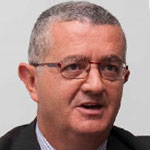 Antonio Nicolás Marchal Escalona
Profesor
Professor
Licenciado y Doctor en Derecho por la UNED y lleva más de 25 años en la docencia.
Antonio Nicolás Marchal Escalona
Profesor
Professor
Licenciado y Doctor en Derecho por la UNED y lleva más de 25 años en la docencia.
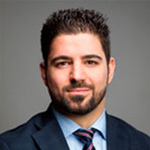 Adrián Nicolás Marchal González
Profesor
Professor
Doctor en Derecho por la Universidad de Castilla La-Mancha, Licenciado en Derecho por la Universidad Carlos III de Madrid, Licenciado en Criminología por la Universidad Camilo José Cela, Máster en Derechos Fundamentales por la Universidad Nacional de Educación a Distancia. Diplomado en Policía Judicial por la Universidad Nacional de Educación a Distancia. Abogado en ejercicio colegiado en el Ilustre Colegio de Abogados de Madrid, especializado en Derecho Penal y nuevas tecnologías. Profesor en el Máster en Criminalística y en el Grado en Criminología y Seguridad de la Universidad Camilo José Cela, profesor del Grado en Criminología de la Universidad Europea Miguel de Cervantes, profesor-tutor del Grado en Criminología de la Universidad Nacional de Educación a distancia, en la actualidad ejercer como profesor en los Grados en Seguridad y Derecho de la Universidad Antonio de Nebrija, ostentando el cargo de Director del Grado en Seguridad. Colaborador habitual en diferentes medios de comunicación, ha publicado diversos artículos en el ámbito del Derecho Penal, Criminología y Política Criminal.
Adrián Nicolás Marchal González
Profesor
Professor
Doctor en Derecho por la Universidad de Castilla La-Mancha, Licenciado en Derecho por la Universidad Carlos III de Madrid, Licenciado en Criminología por la Universidad Camilo José Cela, Máster en Derechos Fundamentales por la Universidad Nacional de Educación a Distancia. Diplomado en Policía Judicial por la Universidad Nacional de Educación a Distancia. Abogado en ejercicio colegiado en el Ilustre Colegio de Abogados de Madrid, especializado en Derecho Penal y nuevas tecnologías. Profesor en el Máster en Criminalística y en el Grado en Criminología y Seguridad de la Universidad Camilo José Cela, profesor del Grado en Criminología de la Universidad Europea Miguel de Cervantes, profesor-tutor del Grado en Criminología de la Universidad Nacional de Educación a distancia, en la actualidad ejercer como profesor en los Grados en Seguridad y Derecho de la Universidad Antonio de Nebrija, ostentando el cargo de Director del Grado en Seguridad. Colaborador habitual en diferentes medios de comunicación, ha publicado diversos artículos en el ámbito del Derecho Penal, Criminología y Política Criminal.
 Andreea Marica
Profesora
Professor
Doctora en Derecho por la Universidad Carlos III de Madrid con la calificación de Cum Laude por unanimidad y con Mención Doctor Internacional. Máster en Derecho Comunitario, Master en Derecho Público y Ciencias Penales, Experto en Crimen Organizado Transnacional y Seguridad.
Andreea Marica
Profesora
Professor
Doctora en Derecho por la Universidad Carlos III de Madrid con la calificación de Cum Laude por unanimidad y con Mención Doctor Internacional. Máster en Derecho Comunitario, Master en Derecho Público y Ciencias Penales, Experto en Crimen Organizado Transnacional y Seguridad.
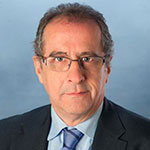 Fernando Marroquin Mochales
Profesor
Professor
Abogado perteneciente al Ilustre Colegio de Abogados de Madrid. Ha desarrollado su carrera como socio del departamento mercantil especializado en derecho societario de diversos despachos, tales como Baker & Mckenzie, Ramón y Cajal Abogados, Alonso Ureba, Bauzá y Asociados y Lexpal Abogados, donde ejerce como Counsel; imparte docencia como profesor colaborador en varias Universidades. Es autor de diferentes artículos en la Revista de Sociedades.
Fernando Marroquin Mochales
Profesor
Professor
Abogado perteneciente al Ilustre Colegio de Abogados de Madrid. Ha desarrollado su carrera como socio del departamento mercantil especializado en derecho societario de diversos despachos, tales como Baker & Mckenzie, Ramón y Cajal Abogados, Alonso Ureba, Bauzá y Asociados y Lexpal Abogados, donde ejerce como Counsel; imparte docencia como profesor colaborador en varias Universidades. Es autor de diferentes artículos en la Revista de Sociedades.
 Laura Martín Santana
Profesora
Professor
Doctor en Derecho por la Universidad Carlos III de Madrid. Profesor de Derecho
Financiero y Tributario
Laura Martín Santana
Profesora
Professor
Doctor en Derecho por la Universidad Carlos III de Madrid. Profesor de Derecho
Financiero y TributarioTesis: “Fiscalidad del Autoconsumo eléctrico de fuentes renovables”. Calificación: sobresaliente cum laude por unanimidad.
Miembro de varios proyectos de investigación, a título individual y colectivo, financiados por organismos públicos, 2010-actualidad. Publicaciones en Quincena Fiscal y en el Instituto de Estudios Fiscales, 2013- actualidad.
Profesora en los Departamento de Derecho Financiero y Tributario de la Universidad Carlos III de Madrid y de la Universidad Complutense, 2010-2014.
Asesora del Gabinete de Presidencia del Tribunal Supremo y del Consejo General del Poder Judicial., 08/01/2014 - 23/06/2019.
Asesora fiscal en DeloitteAsesores Tributarios SL, 28/06/2006 -31/10/2009.
Colegiada en el Ilustre Colegio de Abogados de Madrid. Ejerciente, 2006 – actualidad. Master en Asesoría Fiscal para Profesionales por el Instituto de Empresa de Madrid, 2007. Licenciada en Derecho y Administración y Dirección de Empresas por la Universidad Carlos III de Madrid, 2006
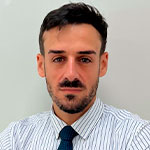 Aitor Martínez Jiménez
Profesor
Professor
Es Doctor en Derecho por la Universidad Carlos III. Previamente realizó los estudios de Licenciado en Derecho por la Universidad de Cádiz y Licenciado en Ciencias Políticas por la Universidad de Granada. Además, ha cursado cuatro masters: Master en Relaciones Internacionales y Diplomacia por la Escuela Diplomática del Ministerio de Asuntos Exteriores, Master en Derecho de la Unión Europea por la UNED, Master en Política y Democracia por la UNED y Master en Ciencia Política y Derecho Constitucional por el Centro de Estudios Políticos y Constitucionales del Ministerio de la Presidencia.
Aitor Martínez Jiménez
Profesor
Professor
Es Doctor en Derecho por la Universidad Carlos III. Previamente realizó los estudios de Licenciado en Derecho por la Universidad de Cádiz y Licenciado en Ciencias Políticas por la Universidad de Granada. Además, ha cursado cuatro masters: Master en Relaciones Internacionales y Diplomacia por la Escuela Diplomática del Ministerio de Asuntos Exteriores, Master en Derecho de la Unión Europea por la UNED, Master en Política y Democracia por la UNED y Master en Ciencia Política y Derecho Constitucional por el Centro de Estudios Políticos y Constitucionales del Ministerio de la Presidencia.Como abogado se destacó por haber guiado relevantes causas internacionales, principalmente en Sudamérica, como la masacre de Curuguaty, causal de la destitución del ex Presidente de Paraguay, Fernando Lugo; o la querella por jurisdicción universal de las víctimas de la dictadura paraguaya y la etnia Aché ante los tribunales argentinos. Se ha desempeñado ante diversas instancias internacionales vinculadas al Sistema Interamericano de Derechos Humanos o al Sistema de Naciones Unidas, entre otros.
Actualmente se desempeña como abogado en el despacho jurídico ILOCAD, dirigido por el jurista español, Baltasar Garzón, desde donde se llevan causas de reconocida relevancia internacional como la defensa del fundador de Wikileaks, Julian Assange, entre otros casos de trascendencia.
Es profesor de las disciplinas de Derecho Internacional, Derecho Penal y Derechos Humanos en universidades españoles y extranjeras. Además, es también coordinador de una Cátedra UNESCO en el ámbito universitario. Cuenta con múltiples publicaciones académicas tanto en el ámbito del Derecho como de la Ciencia Política, siendo sus principales áreas de investigación el Derecho Internacional, la tutela internacional de los Derechos Humanos, las Relaciones Internacionales, los mecanismos de participación política ciudadana y la Teoría Política.
 Guadalupe Medina Casado
Profesora
Professor
Licenciada Económicas Universidad de Sevilla. Grado en Derecho UOC. Profesora Colaboradora Universidad de Sevilla. Departamento Filosofía del Derecho. Directora Escuela de Práctica Jurídica CEFOEC.
Guadalupe Medina Casado
Profesora
Professor
Licenciada Económicas Universidad de Sevilla. Grado en Derecho UOC. Profesora Colaboradora Universidad de Sevilla. Departamento Filosofía del Derecho. Directora Escuela de Práctica Jurídica CEFOEC.
 José Merino Tapia
Profesor
Professor
Licenciado y DEA por la UCM, director de la asesoría jurídica del Colegio de Agentes de la Propiedad Inmobiliaria y abogado.
José Merino Tapia
Profesor
Professor
Licenciado y DEA por la UCM, director de la asesoría jurídica del Colegio de Agentes de la Propiedad Inmobiliaria y abogado.
 José Neftalí Nicolas Garcia
Profesor
Professor
Doctor en Derecho por la Universidad Católica San Antonio (Murcia), Máster universitario en Abogacía y Licenciado en Derecho por la Universidad de Murcia. Ha sido docente de la Licenciatura en Criminología en la Universidad Católica San Antonio. Tiene publicaciones en el ámbito docente e investigador. HA sido ponente y moderador en Congresos científicos de ámbito nacional.
José Neftalí Nicolas Garcia
Profesor
Professor
Doctor en Derecho por la Universidad Católica San Antonio (Murcia), Máster universitario en Abogacía y Licenciado en Derecho por la Universidad de Murcia. Ha sido docente de la Licenciatura en Criminología en la Universidad Católica San Antonio. Tiene publicaciones en el ámbito docente e investigador. HA sido ponente y moderador en Congresos científicos de ámbito nacional.
 Ana Olalde Lopez
Profesora
Professor
Licenciada en Derecho por la Universidad de Oviedo. Máster en Asesoría Jurídica para Empresas por la Universidad Pontificia Comillas. Es especialista en protección de datos, cumplimiento normativo, medios de pago, financiaciones sindicadas, trade finance, regulatorio bancario, factoring y confirming y derecho de los consumidores. Trabaja como Socia Directora en In Capita Abogados y Abogada en Secretaría General en Universidad Nebrija. Ha trabajado como analista renta fija BNP Paribas en Londres ; Letrada asesora en Bankinter, S.A.; Directora Asesoría Jurídica y Cumplimiento Normativo en American Insurance Group; Letrada Asesora Senior en Barclays Bank, S.A.; Responsable Asesoría Jurídica en Banco Santander, S.A. Su actividad docente se centra en el ámbito de protección de datos, derecho bancario y regulatorio y derecho concursal.
Ana Olalde Lopez
Profesora
Professor
Licenciada en Derecho por la Universidad de Oviedo. Máster en Asesoría Jurídica para Empresas por la Universidad Pontificia Comillas. Es especialista en protección de datos, cumplimiento normativo, medios de pago, financiaciones sindicadas, trade finance, regulatorio bancario, factoring y confirming y derecho de los consumidores. Trabaja como Socia Directora en In Capita Abogados y Abogada en Secretaría General en Universidad Nebrija. Ha trabajado como analista renta fija BNP Paribas en Londres ; Letrada asesora en Bankinter, S.A.; Directora Asesoría Jurídica y Cumplimiento Normativo en American Insurance Group; Letrada Asesora Senior en Barclays Bank, S.A.; Responsable Asesoría Jurídica en Banco Santander, S.A. Su actividad docente se centra en el ámbito de protección de datos, derecho bancario y regulatorio y derecho concursal.
 Juan Gonzalo Ospina Serrano
Profesor
Professor
Juan Gonzalo Ospina es un abogado Penalista fundador de su propio despacho Ospina Abogados. Está especializado en cualquier tipo de proceso penal, desde aquellos procedimientos relacionados con las personas o los delitos económicos. Es el diputado más joven del Colegio de Abogados de Madrid desde el 2017. En 2018 escribió el libro El Abogado Líder, Aranzadi con el que da una visión práctica para aquellos que se inician en la abogacía.
Juan Gonzalo Ospina Serrano
Profesor
Professor
Juan Gonzalo Ospina es un abogado Penalista fundador de su propio despacho Ospina Abogados. Está especializado en cualquier tipo de proceso penal, desde aquellos procedimientos relacionados con las personas o los delitos económicos. Es el diputado más joven del Colegio de Abogados de Madrid desde el 2017. En 2018 escribió el libro El Abogado Líder, Aranzadi con el que da una visión práctica para aquellos que se inician en la abogacía.
 Mª Ángeles Palacios García
Profesora
Professor
Licenciada en Derecho por la Universidad de Salamanca. Máster en Seguridad Social y Derecho Laboral por el Centro de Estudios Financieros. Máster en Prevención de Riesgos Laborales, por el Centro de Estudios Financieros. Máster en Prácticas Jurídicas y Procedimiento, por el Centro de Estudios Financieros. Posee una amplia experiencia profesional como consultora y asesora en empresas y ejercicio de la abogacía (Experta en Dirección de Recursos Humanos, Derecho del Trabajo y Seguridad Social).
Mª Ángeles Palacios García
Profesora
Professor
Licenciada en Derecho por la Universidad de Salamanca. Máster en Seguridad Social y Derecho Laboral por el Centro de Estudios Financieros. Máster en Prevención de Riesgos Laborales, por el Centro de Estudios Financieros. Máster en Prácticas Jurídicas y Procedimiento, por el Centro de Estudios Financieros. Posee una amplia experiencia profesional como consultora y asesora en empresas y ejercicio de la abogacía (Experta en Dirección de Recursos Humanos, Derecho del Trabajo y Seguridad Social).
 Jose Carlos Pedraza
Profesor
Professor
Escuela de Práctica Jurídica de la Universidad Complutense de Madrid. Licenciado en Derecho por la Universidad Complutense de Madrid. Ha asistido a conferencias, cursos y congresos relacionados con el Derecho del Trabajo y Seguridad Social, Informático, Administrativo e Internacional Público.
Jose Carlos Pedraza
Profesor
Professor
Escuela de Práctica Jurídica de la Universidad Complutense de Madrid. Licenciado en Derecho por la Universidad Complutense de Madrid. Ha asistido a conferencias, cursos y congresos relacionados con el Derecho del Trabajo y Seguridad Social, Informático, Administrativo e Internacional Público.Ha estado trabajando durante 6 años en la Corte de Arbitraje Económico de Derecho. Durante 6 años en Abogalis ostentando la dirección letrada de ejecuciones civiles. En el año 2010 abrió y puso en marcha el despacho “Pedraza Abogados” que presta servicios profesionales de asesoramiento y dirección letrada en procedimientos judiciales a particulares y empresas.
Ha sido tutor y miembro de tribunales evaluadores de Trabajos Fin de Máster en el Máster de Acceso a la Abogacía y a la Procura de la Universidad Nebrija, además de profesor de “Ámbito Jurídico de la Prevención en el Máster de Prevención de Riesgos Laborales y profesor de Derecho Administrativo del Máster de Acceso a la Abogacia de la Universidad Nebrija.
 Elena Peña Bello
Profesora
Professor
Doble graduada en Derecho y Administración y Dirección de Empresas por la Universidad Autónoma de Madrid y Máster de Acceso a la Abogacía en la Universidad Rey Juan Carlos con el ICAM. Experta en protección de datos y nuevas tecnologías, actualmente trabaja como Asociada Senior del equipo de Privacidad en ECIJA. Es miembro del Ilustre Colegio de Abogados de Madrid.
Elena Peña Bello
Profesora
Professor
Doble graduada en Derecho y Administración y Dirección de Empresas por la Universidad Autónoma de Madrid y Máster de Acceso a la Abogacía en la Universidad Rey Juan Carlos con el ICAM. Experta en protección de datos y nuevas tecnologías, actualmente trabaja como Asociada Senior del equipo de Privacidad en ECIJA. Es miembro del Ilustre Colegio de Abogados de Madrid.
 Ana Maria Pérez Blanco
Profesora
Professor
Licenciada en Derecho por la facultad de Derecho de la Universidad de Granada, Promoción 1993-1998.
Ana Maria Pérez Blanco
Profesora
Professor
Licenciada en Derecho por la facultad de Derecho de la Universidad de Granada, Promoción 1993-1998.Ingreso en la Carrera Judicial en año 2001, con ascenso a la categoría de Magistrada en el año 2005.
Destinos judiciales: titular de los Juzgados de Primera Instancia e Instrucción nº 1 de Martos (Jaén), titular de los Juzgados de Instrucción nº 5 y 3 de Málaga, Juzgado de lo Penal nº 10 de Málaga, Juzgado de Primera Instancia nº 3 de Málaga y nº 42 de Madrid ( actualidad).
Servicios especiales en la Carrera Judicial desde el año 2013, prestando servicios en el Consejo General del Poder Judicial: Jefa de Servicio de la Unidad de Atención Ciudadana y Jefa de Servicio de actuaciones previas y expedientes disciplinarios del servicio del Promotor de la Acción Disciplinaria.
Miembro del Tribunal de las pruebas de especialización en materia mercantil para Jueces y Magistrados en las convocatorias del año 2018 y año 2020.
Actividad docente en la Escuela Judicial y CEJ con las últimas promociones de Jueces, Fiscales, LAJ y cuerpo de gestión de la Administración de Justicia.
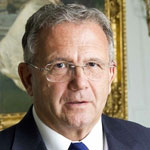 Rogelio Pérez Bustamante
Profesora
Professor
En marzo de 1988 fue nombrado catedrático de Historia del Derecho y de las Instituciones en la Universidad Complutense de Madrid1 y en octubre de 1999 de Historia del Derecho y de la Instituciones en la Universidad Rey Juan Carlos.2 Fue rector de esta última universidad tras resultar electo en unas elecciones celebradas el 25 de octubre de 2000,34 sin embargo cesaría en el cargo en diciembre de ese mismo año, en que fue sustituido por Enrique Otero, tras prosperar en un mes una moción de censura contra Pérez-Bustamante.3
Rogelio Pérez Bustamante
Profesora
Professor
En marzo de 1988 fue nombrado catedrático de Historia del Derecho y de las Instituciones en la Universidad Complutense de Madrid1 y en octubre de 1999 de Historia del Derecho y de la Instituciones en la Universidad Rey Juan Carlos.2 Fue rector de esta última universidad tras resultar electo en unas elecciones celebradas el 25 de octubre de 2000,34 sin embargo cesaría en el cargo en diciembre de ese mismo año, en que fue sustituido por Enrique Otero, tras prosperar en un mes una moción de censura contra Pérez-Bustamante.3Su labor profesional se centra en varias áreas: historia de la Unión Europea, por la que es titular de una Cátedra Jean Monnet, historia del derecho (especializado en la historia de las instituciones españolas), historia de la abogacía española e historia de Cantabria.
En 1996 el Ayuntamiento de Madrid le concedió un Premio Antonio Maura de Investigación5 y en 2008 recibió una medalla de Honor del Consejo de la Abogacía Española.6 En 2015 recibió la Cruz de Honor de la Orden de San Raimundo de Peñafort7 así como la Orden Civil de Alfonso X el Sabio.8 Es miembro correspondiente de la Real Academia de la Historia, de la Real Academia de Jurisprudencia y Legislación9 y de la Academia Portuguesa de Historia.
 Ana E. Quintana Jiménez
Profesora
Professor
Doctora en Turismo por la Universidad Nebrija, y Licenciada en Derecho por la Universidad de Alcalá. En la actualidad desempeña las funciones de Coordinadora del Master en Turismo, del Doctorado en Turismo, y es Directora del grado presencial en Derecho de la Universidad Nebrija. Compagina la investigación con la docencia en el área de grado y posgrado de la Universidad Antonio de Nebrija.
Ana E. Quintana Jiménez
Profesora
Professor
Doctora en Turismo por la Universidad Nebrija, y Licenciada en Derecho por la Universidad de Alcalá. En la actualidad desempeña las funciones de Coordinadora del Master en Turismo, del Doctorado en Turismo, y es Directora del grado presencial en Derecho de la Universidad Nebrija. Compagina la investigación con la docencia en el área de grado y posgrado de la Universidad Antonio de Nebrija.
 Gerardo Quintana Jiménez
Profesor
Professor
Profesor de Derecho Procesal y Empresa en la Nebrija Business School. Doctor en Derecho por la UNED. Ejerce como abogado desde 1994, socio director del Despacho Quintana Abogados, fundado en 1961, especializado en Derecho Penal Económico.
Gerardo Quintana Jiménez
Profesor
Professor
Profesor de Derecho Procesal y Empresa en la Nebrija Business School. Doctor en Derecho por la UNED. Ejerce como abogado desde 1994, socio director del Despacho Quintana Abogados, fundado en 1961, especializado en Derecho Penal Económico.
 David Ramiro Salcedo Sanchez
Profesor
Professor
Licenciado en Derecho y en Administración y Dirección de Empresas por la Universidad Carlos III de Madrid. Curso General sobre Práctica de la Profesión de Abogado en la Escuela de Práctica Jurídica de la Universidad Complutense de Madrid. Formación en Compliance, habilidades propias de la profesión de abogado y especialización en el ámbito de la litigación y defensa civil y penal en diversos cursos y simposios organizados por el ICAM, universidades o centros de estudios. Abogado apasionado de su profesión y ejerciente desde 2010. Miembro del turno de oficio en las jurisdicciones civiles y penales desde el 2017. Experiencia en el ámbito asegurador y alta especialización en litigios derivados de la actividad constructiva, promotora inmobiliaria y de servicios públicos, tanto en la jurisdicción civil como en la penal. Socio fundador de S&S abogados. Profesor del Master en Acceso a la Abogacía y a la Procura en la Universidad Nebrija.
David Ramiro Salcedo Sanchez
Profesor
Professor
Licenciado en Derecho y en Administración y Dirección de Empresas por la Universidad Carlos III de Madrid. Curso General sobre Práctica de la Profesión de Abogado en la Escuela de Práctica Jurídica de la Universidad Complutense de Madrid. Formación en Compliance, habilidades propias de la profesión de abogado y especialización en el ámbito de la litigación y defensa civil y penal en diversos cursos y simposios organizados por el ICAM, universidades o centros de estudios. Abogado apasionado de su profesión y ejerciente desde 2010. Miembro del turno de oficio en las jurisdicciones civiles y penales desde el 2017. Experiencia en el ámbito asegurador y alta especialización en litigios derivados de la actividad constructiva, promotora inmobiliaria y de servicios públicos, tanto en la jurisdicción civil como en la penal. Socio fundador de S&S abogados. Profesor del Master en Acceso a la Abogacía y a la Procura en la Universidad Nebrija.
 Francisco Redondo Trigo
Profesor
Professor
Abogado. Licenciado en Derecho por la Universidad de Salamanca. Doctor acreditado por la ACAP. Académico de la Real Academia de Jurisprudencia y Legislación. Ha desarrollado su carrera profesional, entre otros, en Ventura Garcés y López Ibor y Clifford Chance. En la actualidad es socio director de Redondo, Tessara, Klecker & Co.
Francisco Redondo Trigo
Profesor
Professor
Abogado. Licenciado en Derecho por la Universidad de Salamanca. Doctor acreditado por la ACAP. Académico de la Real Academia de Jurisprudencia y Legislación. Ha desarrollado su carrera profesional, entre otros, en Ventura Garcés y López Ibor y Clifford Chance. En la actualidad es socio director de Redondo, Tessara, Klecker & Co.
 Paola Rodas Paredes
Profesora
Professor
Doctora en Derecho con mención Europea por la Universidad de Valencia (EG). Máster en
Asesoría Jurídica de Empresas por la Universidad Jaime I, Especialista Universitaria en
Educación Superior por la Universidad Rovira I Virgili.
Acreditada a Profesora Titular de Universidad por ANECA, fue Becaria pre‐doctoral FPI en la
Universidad de Valencia donde comenzó su carrera académica‐docente. A partir de 2009 en la
Universidad Rovira I Virgili de Tarragona ha sido docente de Grado y Postgrado de asignaturas
como Derecho Mercantil I, Derecho Mercantil II, Derecho de los Mercados Internacionales,
Derecho de la Competencia, etc. Desde 2011 dirige Trabajos Fin de Grado y Trabajos Fin de
Máster en diversas titulaciones. Ha dirigido una tesis doctoral con mención internacional
(2019) que obtuvo sobresaliente cum laude.
Es autora de dos monografías y multitud de publicaciones en revistas de reconocido prestigio.
Ha realizado estancias de investigación en Londres, Hamburgo y Boston.
Tiene acreditados dos sexenios de investigación y dos quinquenios de docencia.
En la actualidad es Directora del Máster Universitario de Acceso a la Abogacía y a la Procura (modalidad
presencial) y del Máster en Derecho de los Negocios Internacionales y coordina el área de
Derecho Mercantil en la Facultad de Ciencias Sociales.
Paola Rodas Paredes
Profesora
Professor
Doctora en Derecho con mención Europea por la Universidad de Valencia (EG). Máster en
Asesoría Jurídica de Empresas por la Universidad Jaime I, Especialista Universitaria en
Educación Superior por la Universidad Rovira I Virgili.
Acreditada a Profesora Titular de Universidad por ANECA, fue Becaria pre‐doctoral FPI en la
Universidad de Valencia donde comenzó su carrera académica‐docente. A partir de 2009 en la
Universidad Rovira I Virgili de Tarragona ha sido docente de Grado y Postgrado de asignaturas
como Derecho Mercantil I, Derecho Mercantil II, Derecho de los Mercados Internacionales,
Derecho de la Competencia, etc. Desde 2011 dirige Trabajos Fin de Grado y Trabajos Fin de
Máster en diversas titulaciones. Ha dirigido una tesis doctoral con mención internacional
(2019) que obtuvo sobresaliente cum laude.
Es autora de dos monografías y multitud de publicaciones en revistas de reconocido prestigio.
Ha realizado estancias de investigación en Londres, Hamburgo y Boston.
Tiene acreditados dos sexenios de investigación y dos quinquenios de docencia.
En la actualidad es Directora del Máster Universitario de Acceso a la Abogacía y a la Procura (modalidad
presencial) y del Máster en Derecho de los Negocios Internacionales y coordina el área de
Derecho Mercantil en la Facultad de Ciencias Sociales.
 Isabel María Rodríguez García
Profesora
Professor
Licenciada en Derecho por la Universidad Católica de San Antonio de Murcia, desde el año 2010
enfoco mi experiencia académica en el Derecho Penal con diversos cursos en materia de
Violencia de Género, Penal Especial de Menores, Derecho Penal y
Asistencia a Detenido, Derecho Penitenciario y Derechos y Libertades
de los Extranjeros.
Isabel María Rodríguez García
Profesora
Professor
Licenciada en Derecho por la Universidad Católica de San Antonio de Murcia, desde el año 2010
enfoco mi experiencia académica en el Derecho Penal con diversos cursos en materia de
Violencia de Género, Penal Especial de Menores, Derecho Penal y
Asistencia a Detenido, Derecho Penitenciario y Derechos y Libertades
de los Extranjeros.Abogada en ejercicio desde 2011, con intervenciones destacadas en diversos procedimientos penales, llegando a constituir mi propio despacho en 2016.
Desde 2018 hasta la actualidad, colaboro como Vocal 1ª de la Sección de Derecho Penal del Ilustre Colegio de Abogados de Murcia, en la elaboración de diferentes cursos de formación, algunos desde una perspectiva procesal como el “Debate Jurídico del art. 324 LECrim”, “La prueba en el Proceso Penal. Novedades Jurisprudenciales del Tribunal Supremo” impartido por D. Vicente Magro Servet, “El ADN en el ámbito del Código Penal (Guía Euroforgen 2019)”; y otros con colaboraciones institucionales con el Cuerpo Nacional de Policía en las “Jornadas de exposición y debate sobre incidentes críticos” o las “Jornadas sobre las Primeras Actuaciones en Violencia de Género, Familiar y Sexual”. Actuando como organizadora y ponente en el “Curso de Acceso al Turno de Oficio Penal y Asistencia al detenido” del Ilustre Colegio de Abogados de Murcia, en diciembre de 2019.
Asimismo, he participado como ponente en el Congreso “Diálogos de actualidad jurídica. El Caso La Manada” de la Facultad de Derecho de la Universidad de Murcia; en el Curso “El crimen y su proyección cultural”, de la Universidad Internacional del Mar. Campus Mare Nostrum. Universidad de Murcia; y, recientemente, en las “Jornadas sobre Delincuencia Sexual” de la Facultad de Derecho de la Universidad de Murcia. Ponencia: “La actuación de la Fiscalía y la Abogacía en los Delitos Sexuales.
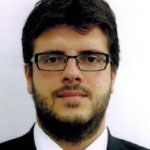 Javier Ruiz Baudot
Profesor
Professor
Licenciado en Derecho por la Universidad Pontificia de Comillas (ICADE). Letrado en ejercicio del Ilustre Colegio de Abogados de Madrid desde enero de 2005, inició su carrera profesional en el área procesal de Santiago Mediano Abogados, despacho especializado en propiedad intelectual e industrial. Posteriormente trabajó en el Gobierno Corporativo y Legal de la empresa cotizada Funespaña, bien prestando apoyo a la Secretaria del Consejo de Administración, bien participando en la llevanza de pleitos o en la asesoría interna de la compañía. En septiembre de 2009 abrió su propio despacho de abogados, en el que ejerce a día de hoy. En su práctica, se ha especializado en el derecho procesal, en las jurisdicciones civil -y mercantil- y contencioso-administrativa.
Javier Ruiz Baudot
Profesor
Professor
Licenciado en Derecho por la Universidad Pontificia de Comillas (ICADE). Letrado en ejercicio del Ilustre Colegio de Abogados de Madrid desde enero de 2005, inició su carrera profesional en el área procesal de Santiago Mediano Abogados, despacho especializado en propiedad intelectual e industrial. Posteriormente trabajó en el Gobierno Corporativo y Legal de la empresa cotizada Funespaña, bien prestando apoyo a la Secretaria del Consejo de Administración, bien participando en la llevanza de pleitos o en la asesoría interna de la compañía. En septiembre de 2009 abrió su propio despacho de abogados, en el que ejerce a día de hoy. En su práctica, se ha especializado en el derecho procesal, en las jurisdicciones civil -y mercantil- y contencioso-administrativa.
 Javier Ruiz Paredes
Profesor
Professor
Licenciado en Derecho por la Universidad Complutense de Madrid (1973-1978). Máster MAJ-IE (1979).
Javier Ruiz Paredes
Profesor
Professor
Licenciado en Derecho por la Universidad Complutense de Madrid (1973-1978). Máster MAJ-IE (1979).Abogado adscrito a los Ilustres Colegios de Abogados de Madrid (1979), Barcelona (1981) y Valencia (1983), en los que ha sido reconocido por las respectivas Juntas de Gobierno su ejercicio profesional durante más de veinticinco años.
Ha realizado se carrera profesional en Bufete Armero y en Uría Menéndez Abogados, siendo socio en ambas firmas.
Especialista en Derecho Civil, Constitucional y Mercantil, con experiencia en la práctica contenciosa ante Juzgados y Tribunales de diversas Comunidades Autónomas y ante el Tribunal Supremo; asimismo, ante sedes de Arbitraje Comercial internacional en asuntos de relevancia empresarial.
Abogado recomendado en el ámbito de Resolución de Conflictos por publicaciones españolas e internacionales.
Docente en cursos de postgrado en varias universidades y escuelas de negocios, actualmente en Nebrija Business School, y de formación de abogados del ICAM sobre materias específicas, desde 1990.
Actualmente compatibiliza su actividad profesional con su pertenencia a los Patronatos de la Fundación Acción contra el Hambre y de la Fundación Exit, en las que ejerce la labor de Secretario de los respectivos patronatos.
Pertenece al claustro de profesores del Máster en Derecho Empresarial de la Escuela de Negocios de la Universidad Antonio de Nebrija desde hace veinte años.
 Ana Salinas López
Profesora
Professor
Abogada especialista en Derecho Internacional Privado y mercantil. Consultora en Arbitraje comercial nacional e internacional. Mediadora mercantil. Doctora en Derecho por la UNED. Máster en Derecho de la UE y en Resolución de conflictos internacionales. Autora de varios artículos y obras colectivas
Ana Salinas López
Profesora
Professor
Abogada especialista en Derecho Internacional Privado y mercantil. Consultora en Arbitraje comercial nacional e internacional. Mediadora mercantil. Doctora en Derecho por la UNED. Máster en Derecho de la UE y en Resolución de conflictos internacionales. Autora de varios artículos y obras colectivas
 Mª Luisa Sánchez Paredes
Profesora
Professor
Doctora en Derecho por la Universidad San Pablo-CEU de Madrid. Ponente en Cursos de Posgrado, Seminarios y Masters Universitarios tanto en versión presencial como on line. En la actualidad, es docente en las Facultades de Derecho de la Universidad San Pablo-CEU de Madrid y en la Universidad Antonio de Nebrija, en el Master Universitario en Derecho Empresarial (MDE) de la Nebrija Business School y en el Master en Insolvencia Empresarial (MIE) de la USP-CEU. Miembro de la Secretaría del Anuario de Derecho Concursal (ADCo) y de la Asociación Española de Derecho de la Insolvencia (AEDIN). Coordinadora del Congreso Español de Derecho de la Insolvencia (CEDIN).
Mª Luisa Sánchez Paredes
Profesora
Professor
Doctora en Derecho por la Universidad San Pablo-CEU de Madrid. Ponente en Cursos de Posgrado, Seminarios y Masters Universitarios tanto en versión presencial como on line. En la actualidad, es docente en las Facultades de Derecho de la Universidad San Pablo-CEU de Madrid y en la Universidad Antonio de Nebrija, en el Master Universitario en Derecho Empresarial (MDE) de la Nebrija Business School y en el Master en Insolvencia Empresarial (MIE) de la USP-CEU. Miembro de la Secretaría del Anuario de Derecho Concursal (ADCo) y de la Asociación Española de Derecho de la Insolvencia (AEDIN). Coordinadora del Congreso Español de Derecho de la Insolvencia (CEDIN).
 Enrique Sanz de Sandoval
Profesor
Professor
Licenciado en Derecho por la Universidad Autónoma de Madrid.
Enrique Sanz de Sandoval
Profesor
Professor
Licenciado en Derecho por la Universidad Autónoma de Madrid.Master en Asesoría Fiscal de Empresas por el Instituto de Empresa.
European Financial Advisor (EFPA Europe).
Abogado fiscalista senior en Garrigues Abogados y Asesores Tributarios (2002 – 2005).
Letrado de Asesoría y Planificación Patrimonial de BNP Paribas Wealth Management (2005 – Actualidad).
Profesor Asociado en Nebrija Business School.
Ponente habitual en seminarios sobre fiscalidad de la empresa familiar.
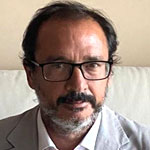 Luis Shaw Morcillo
Profesor
Professor
Licenciado en Derecho por la Universidad de Granada, con acceso a la Carrera Judicial en el año 1993 con último destino en Malaga, sección VI, especialista en Derecho Mercantil.
Luis Shaw Morcillo
Profesor
Professor
Licenciado en Derecho por la Universidad de Granada, con acceso a la Carrera Judicial en el año 1993 con último destino en Malaga, sección VI, especialista en Derecho Mercantil.
Tiene la Medalla al mérito colegial del Colegio de Abogados de Jaén, impuesta el 17 de diciembre de 2021. Es además Ponente habitual en Jornadas y Congresos sobre derecho mercantil y concursal, como las organizadas por EXFIMER, foros Aranzadi, Instituto de Empresa, Aula Concursal, Consejo General del Poder Judicial, Colegio Abogados, Colegio de Economistas.
 Jorge de Pedro Torres Guillen
Profesor
Professor
Licenciado en Derecho por la Universidad de Murcia 2007-2012. Secretario de la Asociación Jóvenes Juristas de la Universidad de Murcia de 2009 a 2012. Letrado en ejercicio con despacho profesional propio en la ciudad de Cartagena y de Murcia desde 2012. Especializado en Derecho Penal, Civil, de Familia, Bancario y Laboral. Asesoria externa de empresas. Master en Investigación Jurídica Avanzadas por la Universidad de Murcia, Tesina “Patriotismo y Lealtad constitucional pasado, presente y futuro” realizada en el año 2013- 2014. Participación en distintas ponencias y seminarios impartidos por la Universidad de Murcia. Director tutor de TFM del Master de la Abogacía en la Universidad de Nebrija y vocal en los Tribunales de defensa año 2019-2020.
Jorge de Pedro Torres Guillen
Profesor
Professor
Licenciado en Derecho por la Universidad de Murcia 2007-2012. Secretario de la Asociación Jóvenes Juristas de la Universidad de Murcia de 2009 a 2012. Letrado en ejercicio con despacho profesional propio en la ciudad de Cartagena y de Murcia desde 2012. Especializado en Derecho Penal, Civil, de Familia, Bancario y Laboral. Asesoria externa de empresas. Master en Investigación Jurídica Avanzadas por la Universidad de Murcia, Tesina “Patriotismo y Lealtad constitucional pasado, presente y futuro” realizada en el año 2013- 2014. Participación en distintas ponencias y seminarios impartidos por la Universidad de Murcia. Director tutor de TFM del Master de la Abogacía en la Universidad de Nebrija y vocal en los Tribunales de defensa año 2019-2020.
 Belen Triviño Fernández
Profesora
Professor
Licenciada en Derecho por la Universidad Pompeu Fabra. Así mismo, titulada en Máster en Abogacía en el Instituto Superior de Derecho (ISDE) y Curso Superior Blanqueo de Capitales en Centro Internacional de Formación Financiera (CIFF).
Belen Triviño Fernández
Profesora
Professor
Licenciada en Derecho por la Universidad Pompeu Fabra. Así mismo, titulada en Máster en Abogacía en el Instituto Superior de Derecho (ISDE) y Curso Superior Blanqueo de Capitales en Centro Internacional de Formación Financiera (CIFF). Desde 2003 es responsable del Departamento contencioso y de concursos de Acreedores. Auditora de blanqueo de capital. Assistant cualificada en materia publicitaria, promocional y Protección de datos.
More Academic Information
Official Degree:Master's Degree in Legal Practice and Representation
The profile sought is that of graduates of the Bachelor's Degree in Law, or an equivalent program, as established by regulatory standards. We assess qualities that allow us to expect their adequate integration in the group, such as the ability to converse, having an open mind, the willingness to share and actively participate in the course, etc. The program is enriched thanks to the varied origin of its participants, as this favors knowledge in the management of international companies and intercultural exchange.
To access this Master's Degree, the student must have a Bachelor's Degree in Law, or a similar university program that meets the requirements established in Article 3 of Regulation 34/2006, of 30 October, on practicing the professions of Lawyer and Court Attorney, approved by Royal Decree 775/2011, of June 3, or where appropriate, certifications substituting the university degree.
Applicants with degrees obtained abroad must have the accrediting documents that prove their recognition, or, where appropriate, have obtained the Bachelor's Degree in Law at a Spanish University following the corresponding recognition process carried out by the respective university.
Applicants must meet this requirement prior to being admitted to the specialized training course for accessing the profession of Lawyer, in accordance with Royal Decree 775/2011, of June 3, which approved Regulation 34/2006, of October 30, on accessing the professions of Lawyer and Court Attorney.
The graduate profile is that of people capable of:
- Practicing Law and being able of successfully passing the examination of the Ministry of Justice in order to practice Law.
- Provide our graduates with exceptional education, taught by professionals and professors of recognized prestige in the world of Law, based on respect for professional ethics and the values of practicing this profession.
- In summary, our graduates are people capable of passing the State examination (more than 95% success rate) and with an employability level higher than 90%.
60 ECTS credits.
Minimum 12 ECTS and maximum 60 ECTS per registration and academic period
Center responsible:School of Law and International Relations
Branch of knowledge: Social and Legal Sciences
Available places: - Classroom attendance: 70
– Online: 600
Type of Education: Classroom Attendance / Online
Total Credits:90 ECTS credits.
Academic year in which it was implemented: 2013-2014
Languages: Spanish
Duration: 1 year
University Services: [+info]
Skills
Knowledge or content (Knowledge)- Graduates will be able to recognize in the elaboration of procedural documents, in interrogations and in expert evidence, the techniques aimed at investigating and establishing the facts in the different types of proceedings.
- Graduates will be able to describe in detail the different interest composition techniques.
- Graduates will be able to identify the different responsibilities linked to practicing the profession, including the basic functioning of free legal assistance and the promotion of the social responsibility of the person who practices as lawyer or court attorney.
- Graduates will be able to recognize the situations of conflict of interests that can take place in legal practice.
- Graduates will be able to identify the most relevant conflict resolution techniques in each situation and context.
- Graduates will be able to formulate the determining requirements of benefit and organization for legal counsel and procedural representation.
- Graduates may determine the administrative or judicial authority and the proceeding action to defend clients' rights.
- Graduates may recognize the appropriate legal instrument to represent the interested parties before third parties, before public administrations and before judicial bodies.
- Graduates will be able to identify the legal acts that require, for their effectiveness, notarial intervention and those that need registration.
A real correspondence has been sought between the proposed generic competencies, with those developed in similar educational entities, in other countries in the area of influence, especially in the EU. It is evident that this relationship has been found in the identity between subjects taught and studied in the different training systems and the competence objectives that are projected. Likewise, the Benchmark Statements for Master's Degree of the Quality Assurance Agency (QAA) of the United Kingdom have been consulted.
- Graduates will be able to correctly and adequately apply the specialized knowledge acquired in the degree in their professional before courts or public authorities, as well as in advisory functions, respecting democratic principles and values, and the Sustainable Development Goals.
- Graduates may properly use alternative methods to the judicial route for the resolution of legal conflicts.
- Graduates will be able to carry out the acts of communication effectively and correctly with the parties in the process.
- Graduates will be able to differentiate, clearly and precisely, the private interests that legal professionals represent from those of a public nature, whose execution is entrusted by the law and the courts, for effective collaboration with the courts in the execution of judicial decisions.
- Graduates will be able to apply the most relevant conflict resolution techniques to each situation and context, establish the scope of professional secrecy and preserve the independence of judgement.
- Graduates may use the judicial procedures, protocols, systems and applications that are required by acts of communication and cooperation with the Administration of Justice, with special attention to those of an electronic, computer and telematic nature.
- Graduates will be able to create teamwork techniques aimed at achieving greater efficiency through access to sources of information, knowledge of languages, knowledge management and management of applied techniques and tools.
- Graduates may plan the organizational structure of the legal office based on the human resources that make it up and the type of clients to whom it is addressed.
- Graduates may carry out professional work in specialized and interdisciplinary teams.
- Graduates will effectively know and use the right to defense and the procedural application of clients within the framework of the national and international judicial protection systems.
- Graduates will know and adequately use the procedural techniques in the execution of the acts that take place in the different judicial orders, with special attention to the terms, minutes, execution and means of enforcement.
- Graduates may incorporate the deontological rights and duties of a lawyer or attorney in their relations with clients, other parties, courts, authorities and other professionals.
- Graduates will know and apply the most pertinent techniques in each case aimed at the identification and liquidation of customs duties, tax obligations, the constitution of judicial deposits and attention to whatever expenses and costs are necessary to guarantee the effective judicial protection of the rights of the represented persons.
- Graduates may create the organizational structure of the legal office based on the human resources that make it up and the type of clients to whom it is addressed, and establish an economic and fiscal management protocol for the professional office, compliance and protection of occupational risks and personal data.
- Graduates will be able to express themselves orally and in writing, appropriately within the context and the needs or special characteristics of each client, and extract legal consequences from the facts in an argued manner, in all procedural areas.
- Graduates will be able to interact appropriately with citizens, institutions and other professional people.
Online Modality Master’s Degree in Legal Practice and Representation
Online education with a practical approach
This official distance learning Master's degree is intended to train future legal professionals, and offers a practical curriculum and an active professional teaching staff. It also offers the ease of completing the degree from home or work, when and where you want.
The program offers the "Quid Legal" exam simulation tool to prepare for the entrance exam and the exclusive access "Mementos Abogacía de Lefebvre", tool, an instrument of jurisprudential analysis that defines the most suitable procedural strategy for the case's success.
Methodology
The methodology is eminently practical, as it follows the case method. Continuous evaluation and personalized attention are two of the fundamental characteristics of this Master's degree. It uses the Blackboard learning platform. The professors are active professionals and PhDs, the groups are small, which guarantees the quality of the education received.
Calendar and Schedules
Academic calendar Classroom attendance modality schedule Online modality schedule
Admission Process
The admission process consists of the following phases:
Submission of documentationThe following documentation must be sent by post or courier to the Postgraduate Admissions Section:
- Completed Admission Application.
- Updated Curriculum Vitae.
- Photocopy of DNI (only Spanish candidates) or passport (only foreign candidates).
- Photocopy of Transcript / Academic record (completed or in the last year of the university degree).
- Two passport-size, color photographs.
- Document that proves the candidate has a B2 Intermediate Level in Spanish (for non-Spanish speakers who wish to study the Master's degree).
- Official university degree of Bachelor's or Degree in Law.
Once all the documentation has been received, and it is verified that the submitted degree grants access to a Master's degree, as established in Arts. 15 and 16 of Royal Decree 1393/2007, candidates must take the proficiency test of the chosen program, which is carried out by the Department of University Development.
The test is taken in person in Madrid and in various Spanish cities and, additionally, it can be taken remotely for those applicants residing outside of Spain.
The proficiency test, which intends to analyze the student's capacity to complete the Master's program, assesses the applicant's profile and abilities, so it does not require prior preparation and allows the student to receive more comprehensive and personalized advice on his/her academic and professional options.
The proficiency test consists of three parts. The first is an aptitude test that assesses the maturity of the student, as well as analyzes the reasons that lead him/her to study at this University. The second is a Spanish level test, where appropriate, for those students who cannot prove that they have the required level, in which the Intermediate Level must be reached; and the third phase is a face-to-face or telephone interview with the Coordinator of the Program in which he/she is enrolling, or with the Department Head.
Once the aforementioned proficiency test has been passed, the candidate holds a personal interview with the Coordinator of the Program in which he/she is enrolling or with the Department Head.
2.- After the admission tests, the Admissions Committee analyzes the results and the documentation submitted by the candidate, and approves or rejects the application. The candidate receives written information about his/her admission, about the process of formalizing his/her enrollment in the Program, and about the final documentation to be submitted, duly authenticated.
3.- Formalize registration and enrollment
After registration, the candidate proceeds to formalize his/her enrollment, choosing the courses online and completing the required information. Throughout the process, the candidate is in constant contact with the Department of University Development and with the academic managers of the chosen Program, who will advise him/her on any questions.
The weighting of the different phases are as follows:
- Admission test: 25%
- Interview: 25%
- Academic record of previous studies: 50%
Employability
Career Opportunities
The career opportunities of a program such as the Master's Degree in Legal Practice and Representation are determined by regulations, since its primary vocation is to train students to professional practice of law and prosecution, as its name indicates. However, as a University Master's degree adapted to the European Higher Education Area, it qualifies the student to access the Doctorate, and entails, in any case, an ideal framework for advanced legal training.
Collaboration Agreements for professional practices
This Master maintains collaboration agreements for professional practices with some of the best companies and institutions in the sector, among which the following stand out:
Activities in Legal Practice and Representation
Visit all the Activities of the School of Law and International Relations
Legal Clinic
The purpose of this initiative is to provide first-rate legal counsel and practice to non-profit organizations, covering real legal needs of social interest and in a totally voluntary and altruistic way.
This legal counsel is carried out by the students of the Department of Law (Bachelor's and Master's Degrees). It allows them to know in depth specific areas of law, put them into practice, always under the coordination of the university's clinic managers and the legal direction of the lawyers appointed by the firms.
Thanks to this activity, students will be able to increase their visibility in the job market, enhance their personal brand and have access to network in that area. Also, national meetings are organized, providing contact with the best law offices and firms. Likewise, they will be able to see first-hand real and effective legal practice with mentors with extensive experience.
It generates professional experience, new contacts, up-to-date knowledge, responsibilities and challenges, individually and in groups.
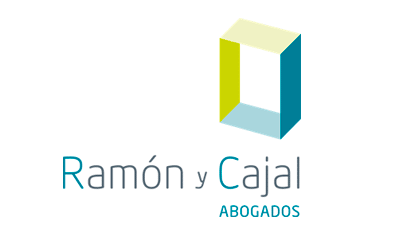



To carry out this project, collaboration agreements have been signed with four of the best law firms in our country.
Master’s Degree in Legal Practice and Representation
This Master's degree completely focused on the preparation for the Ministry of Justice's entrance exams, in order to turn young lawyers into expert professionals in legal practice and prosecution, developing all the required competences and abilities.


